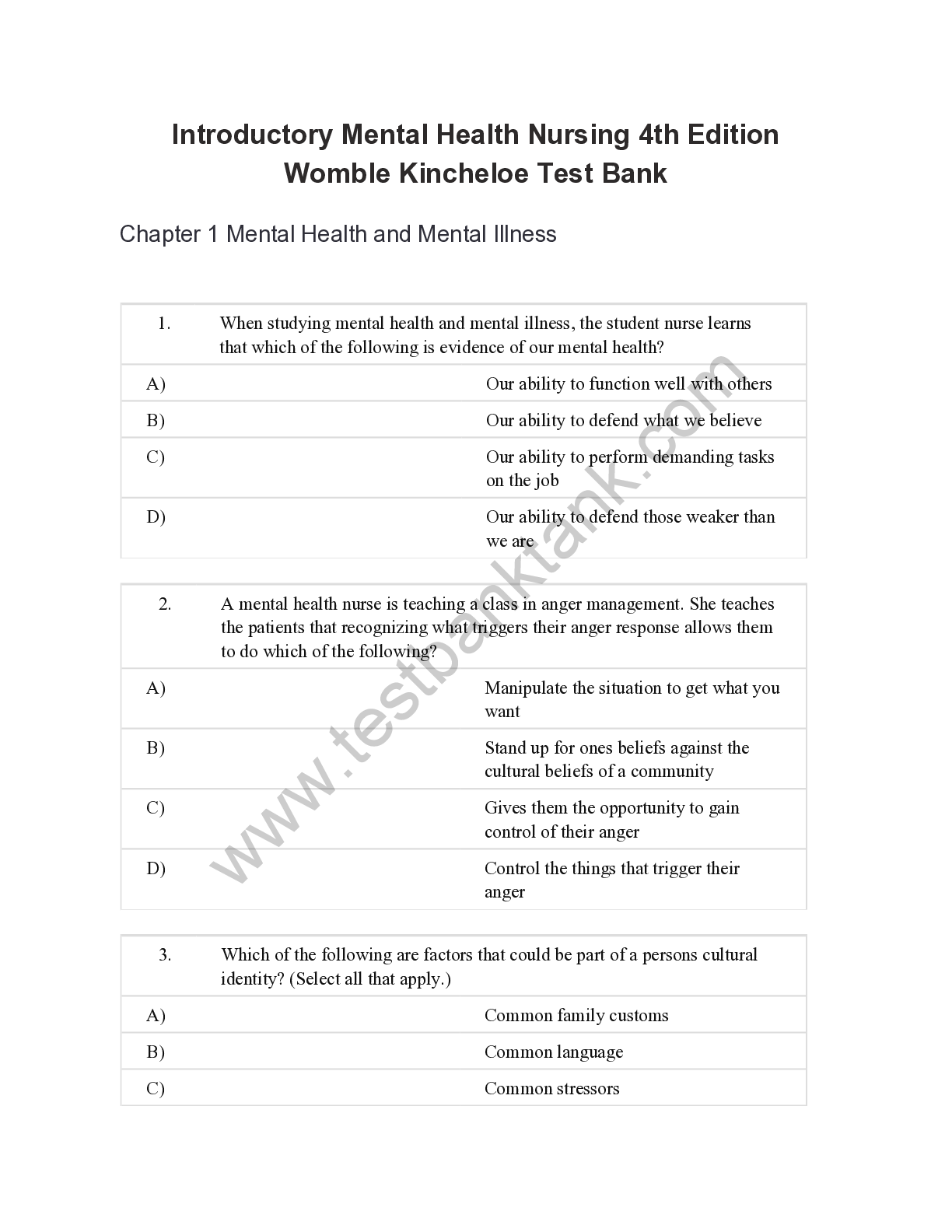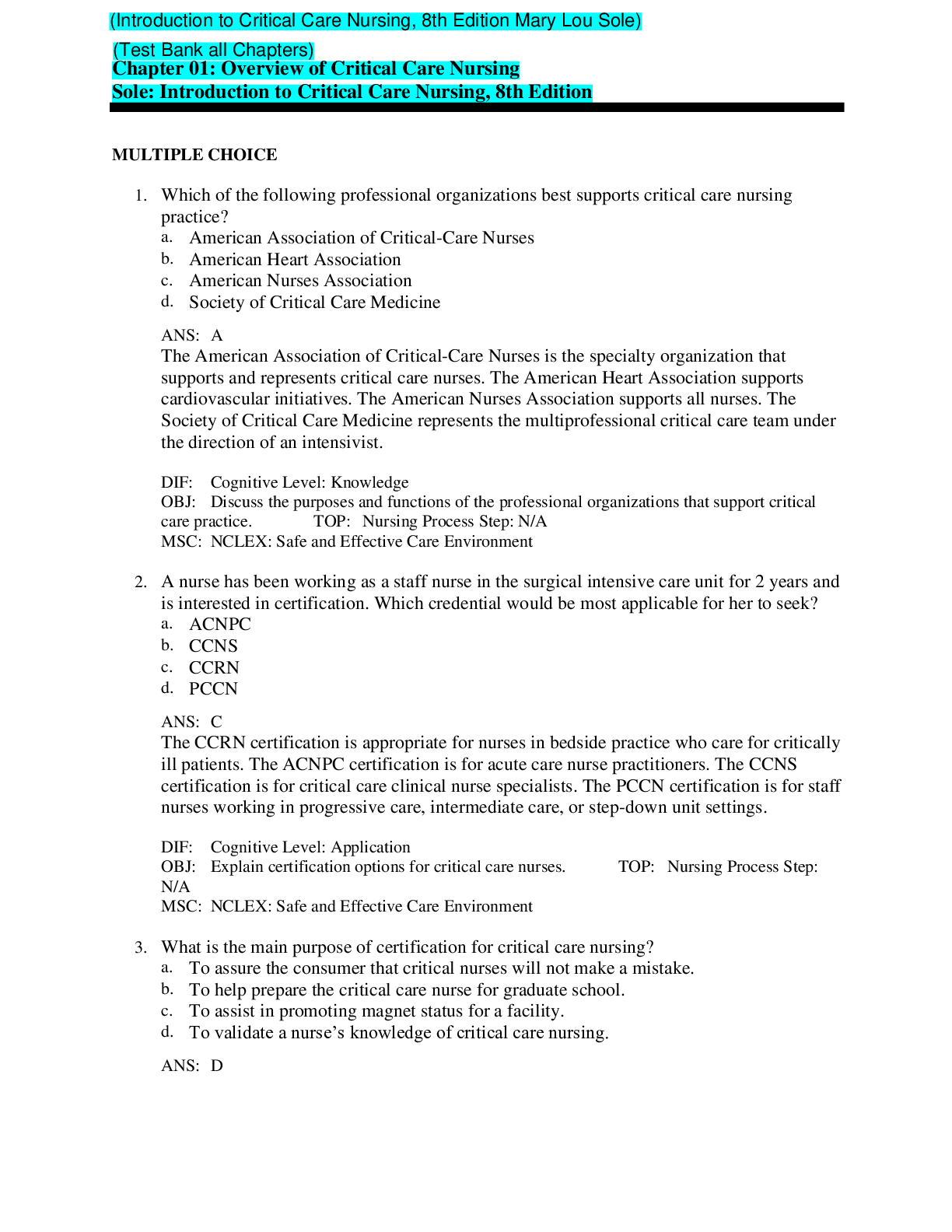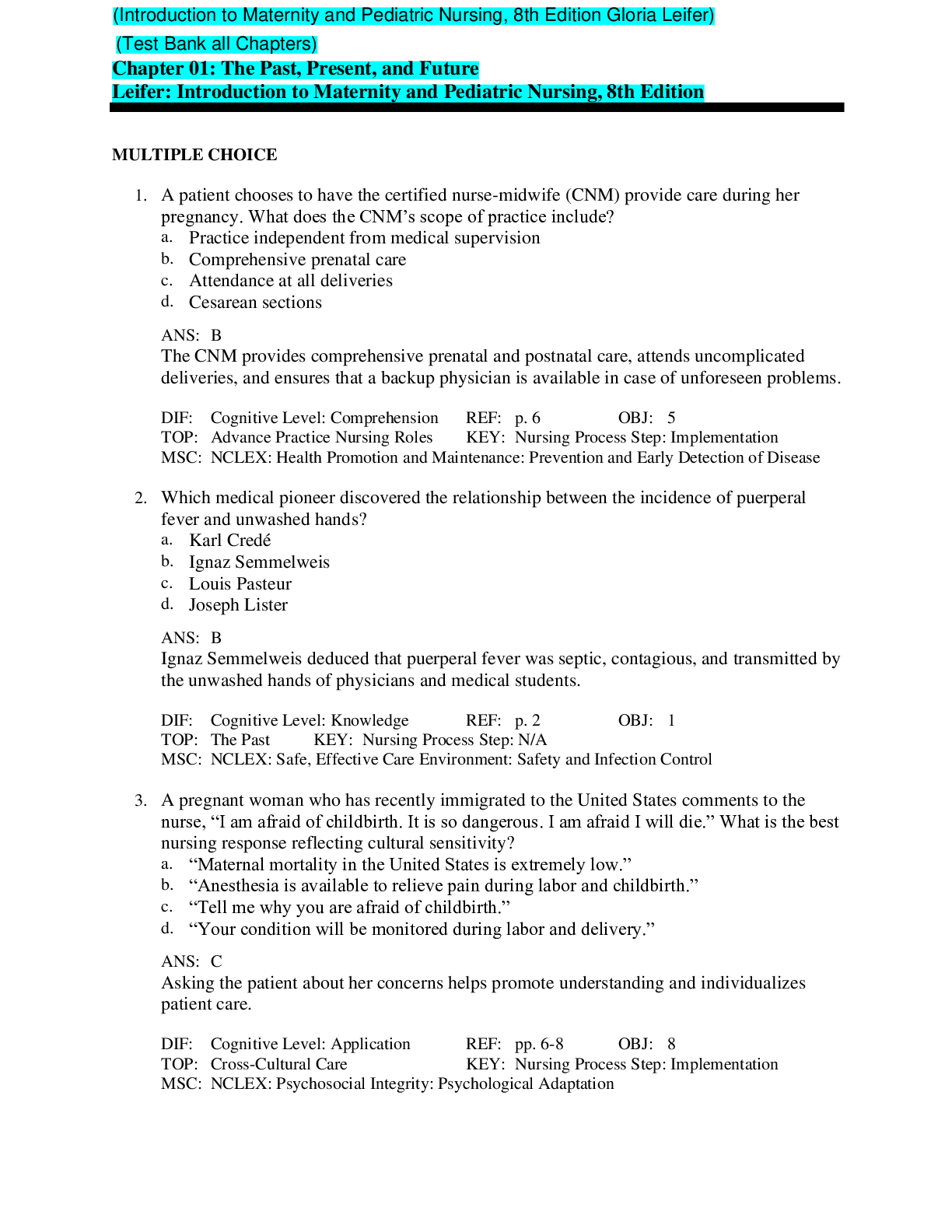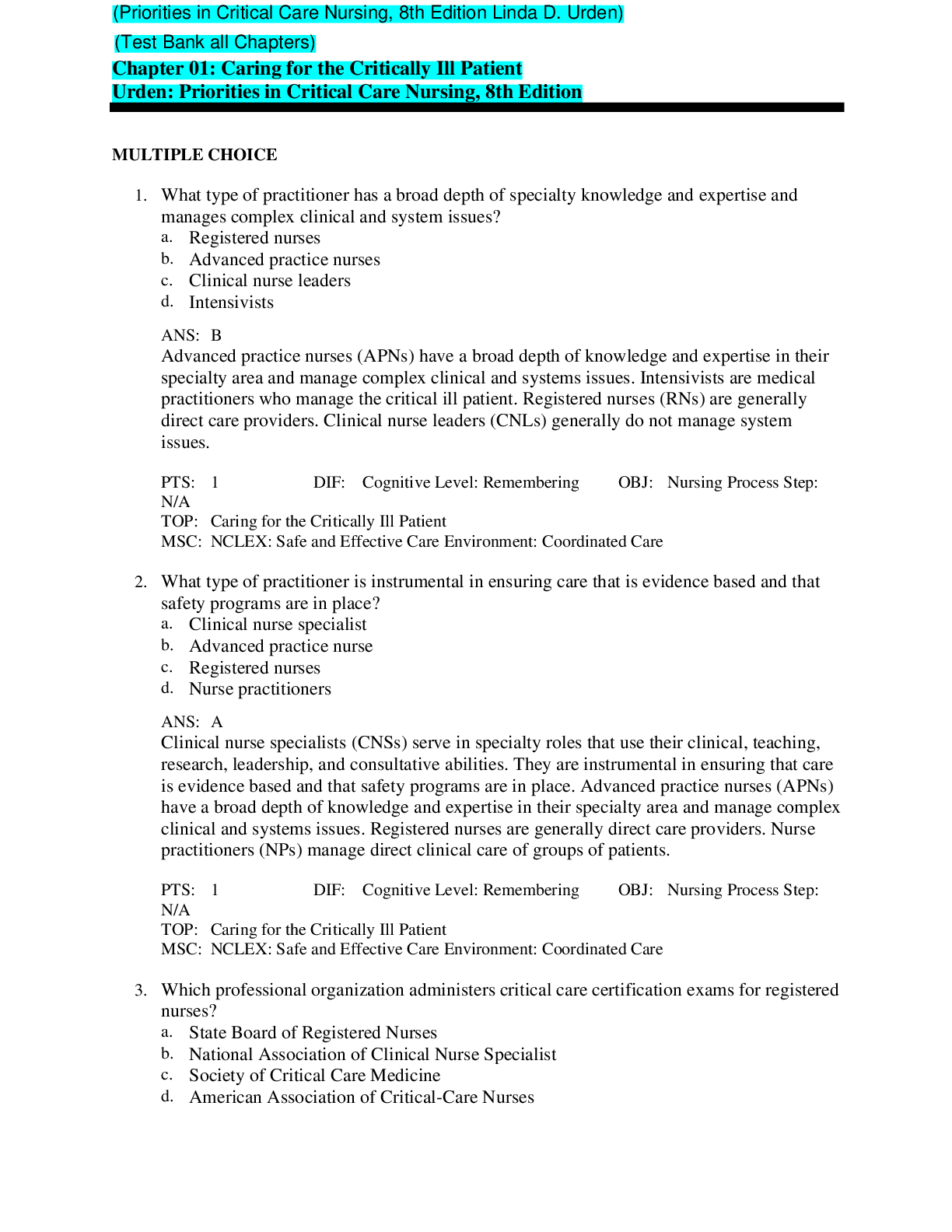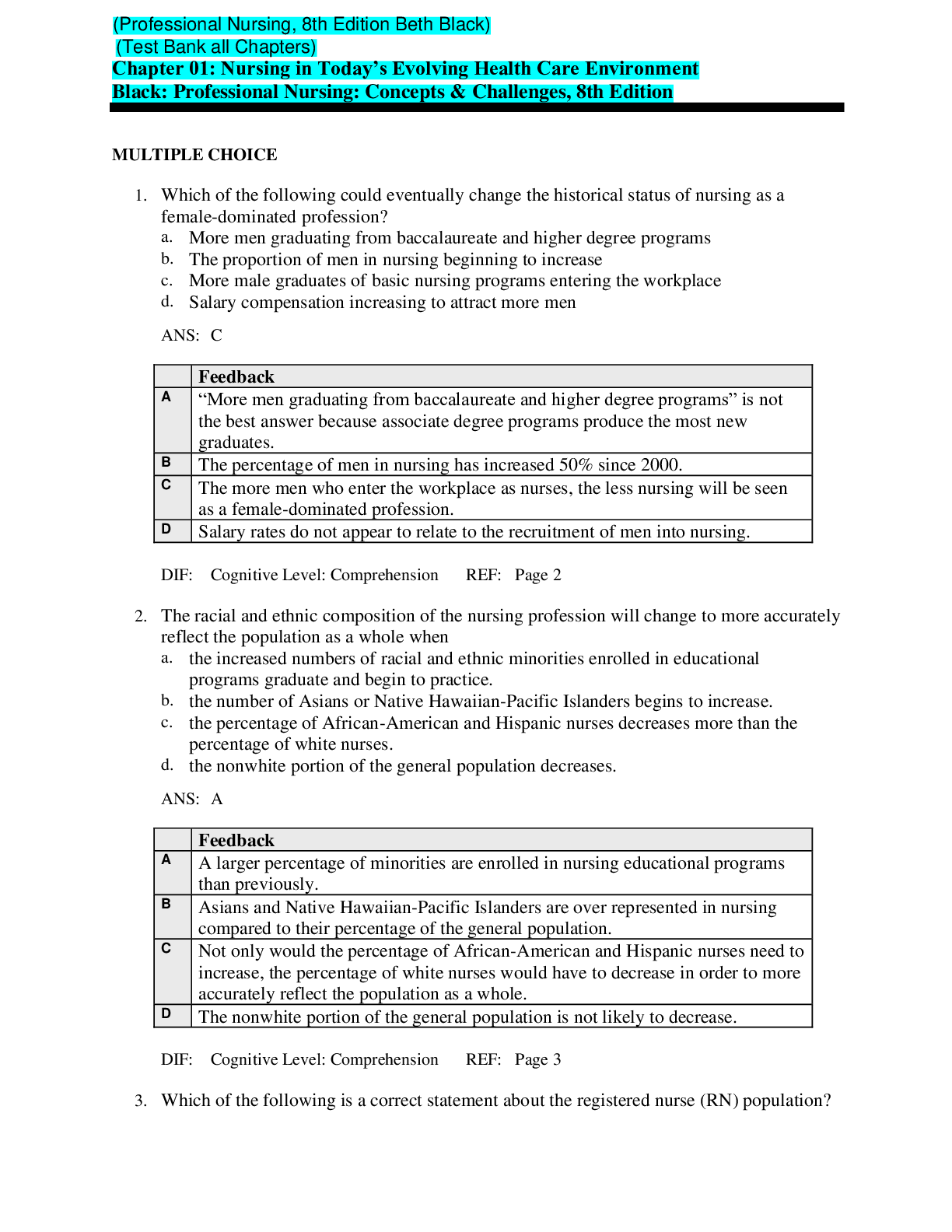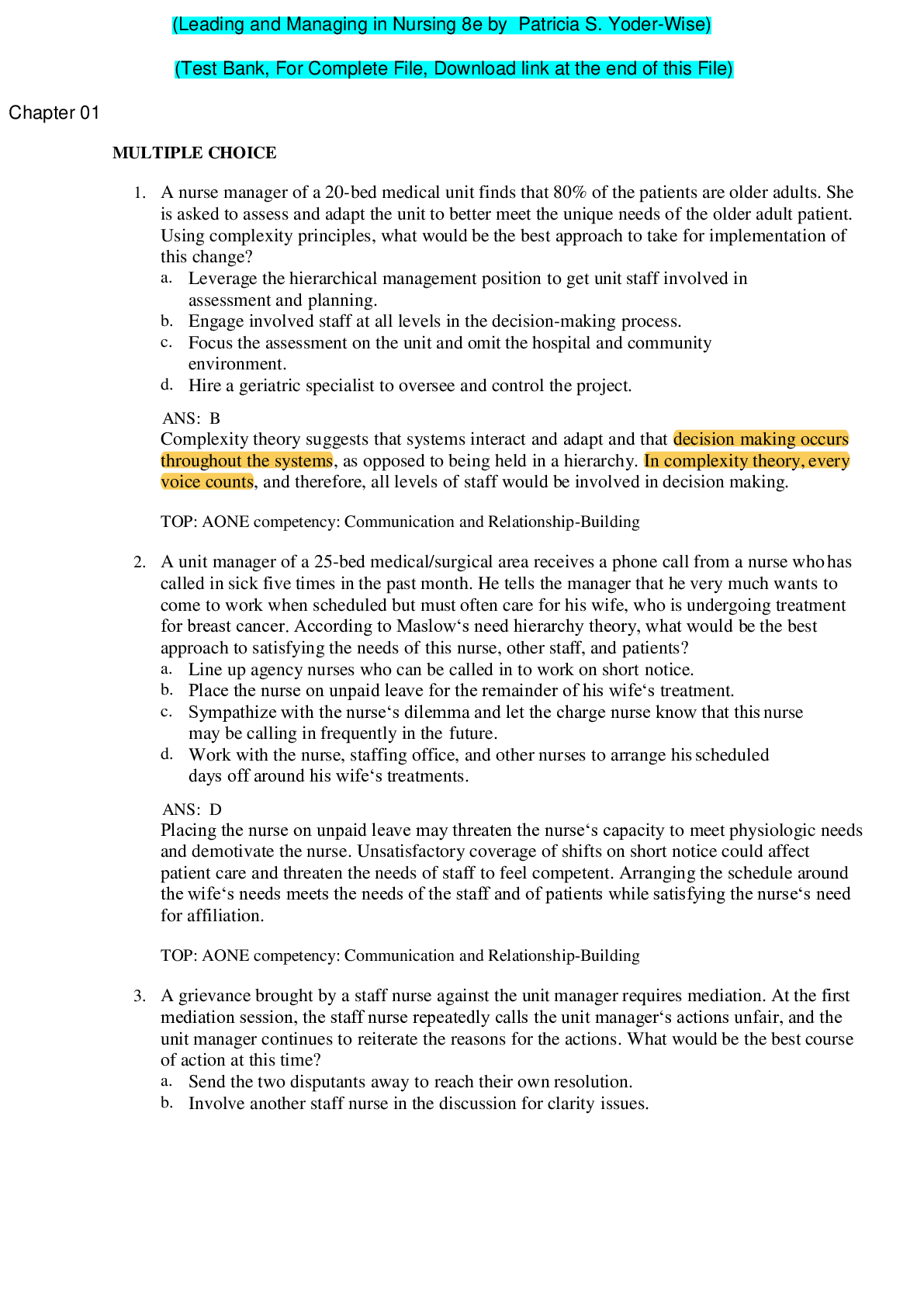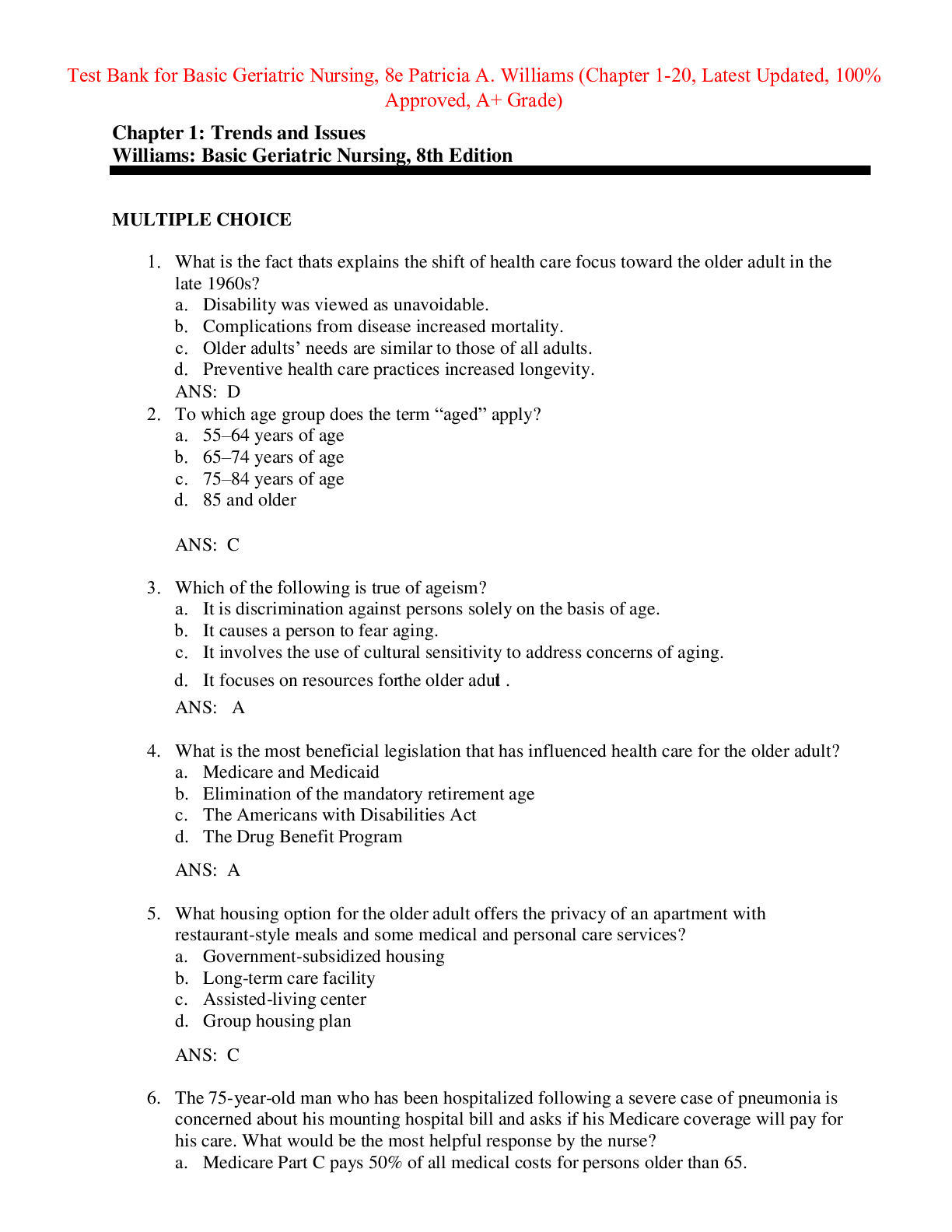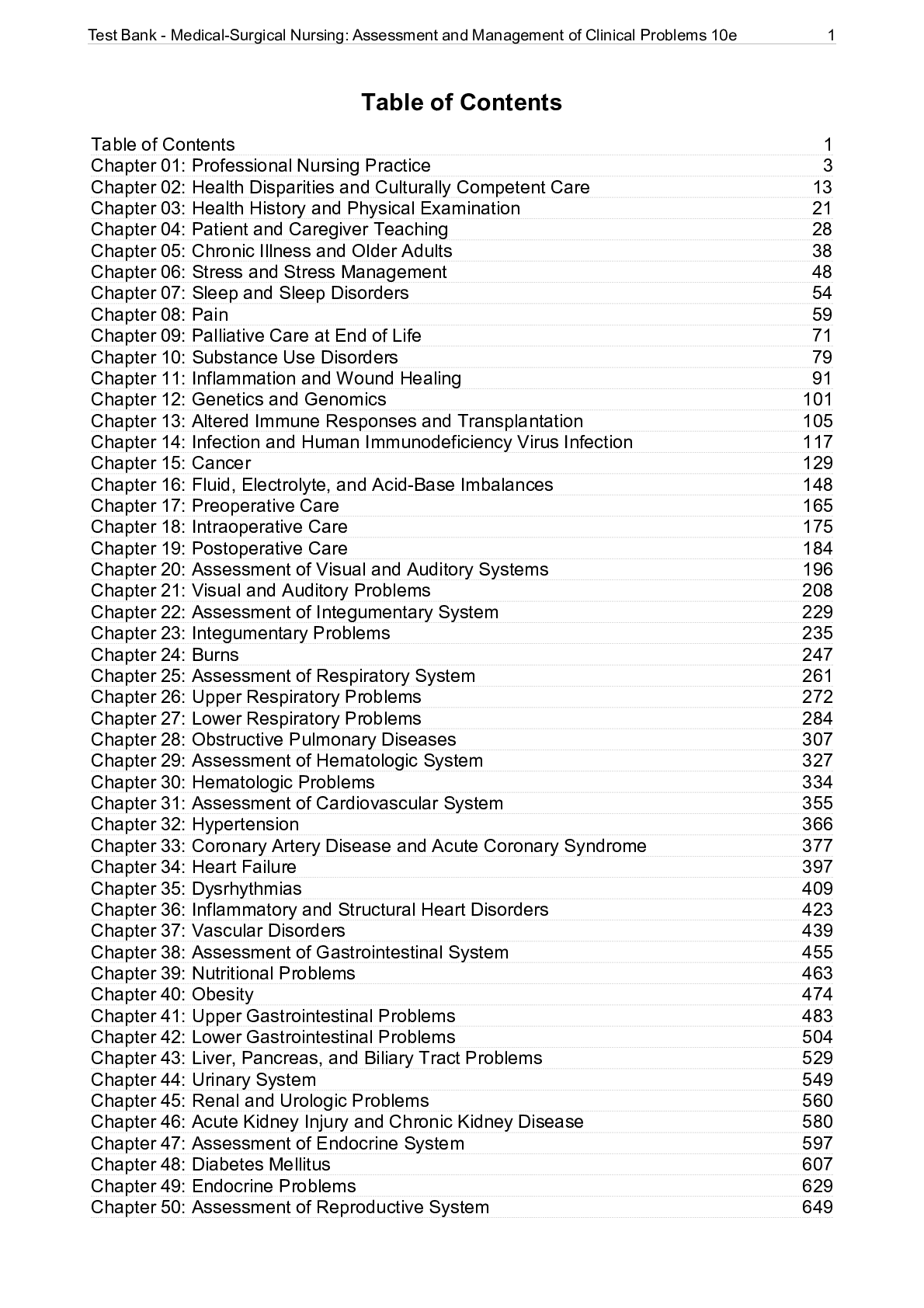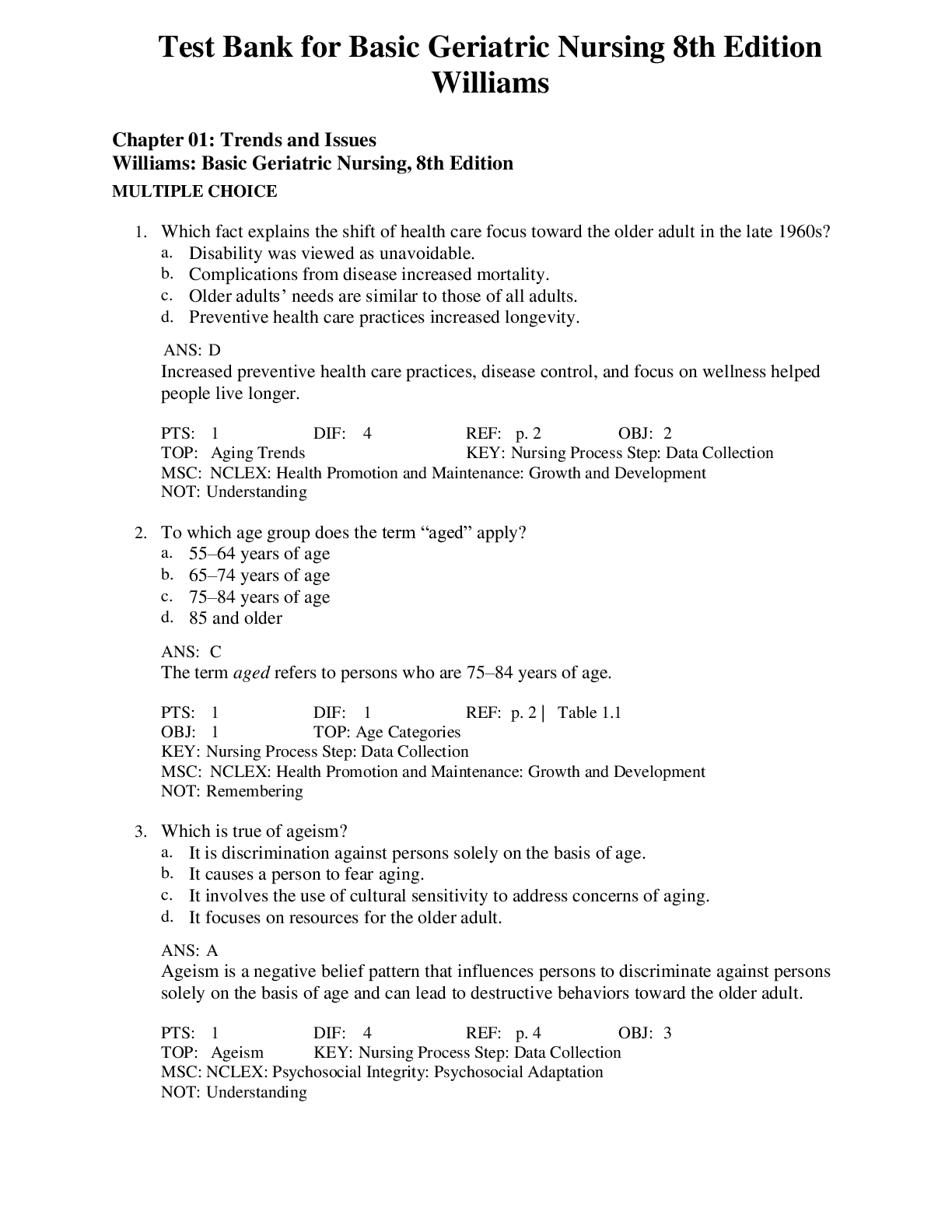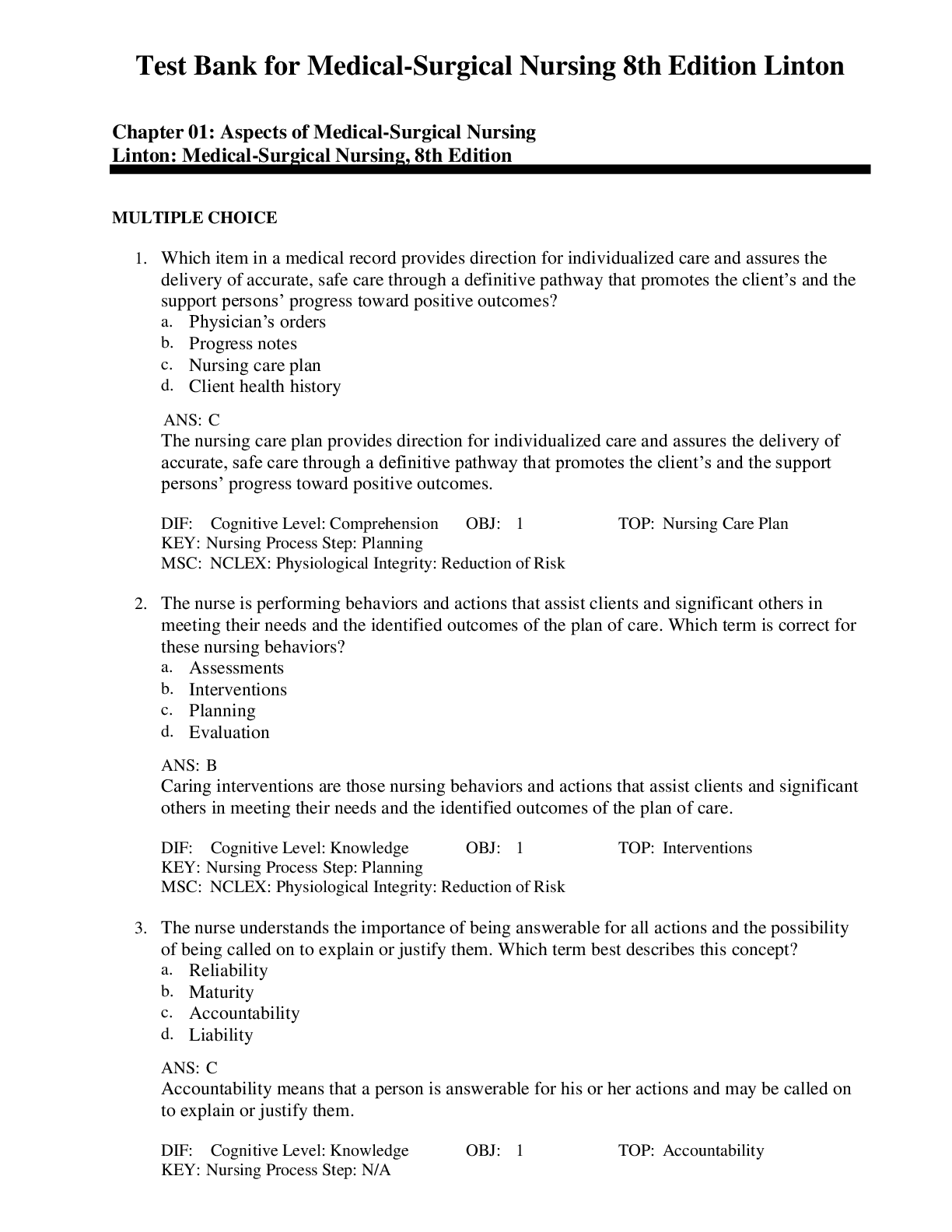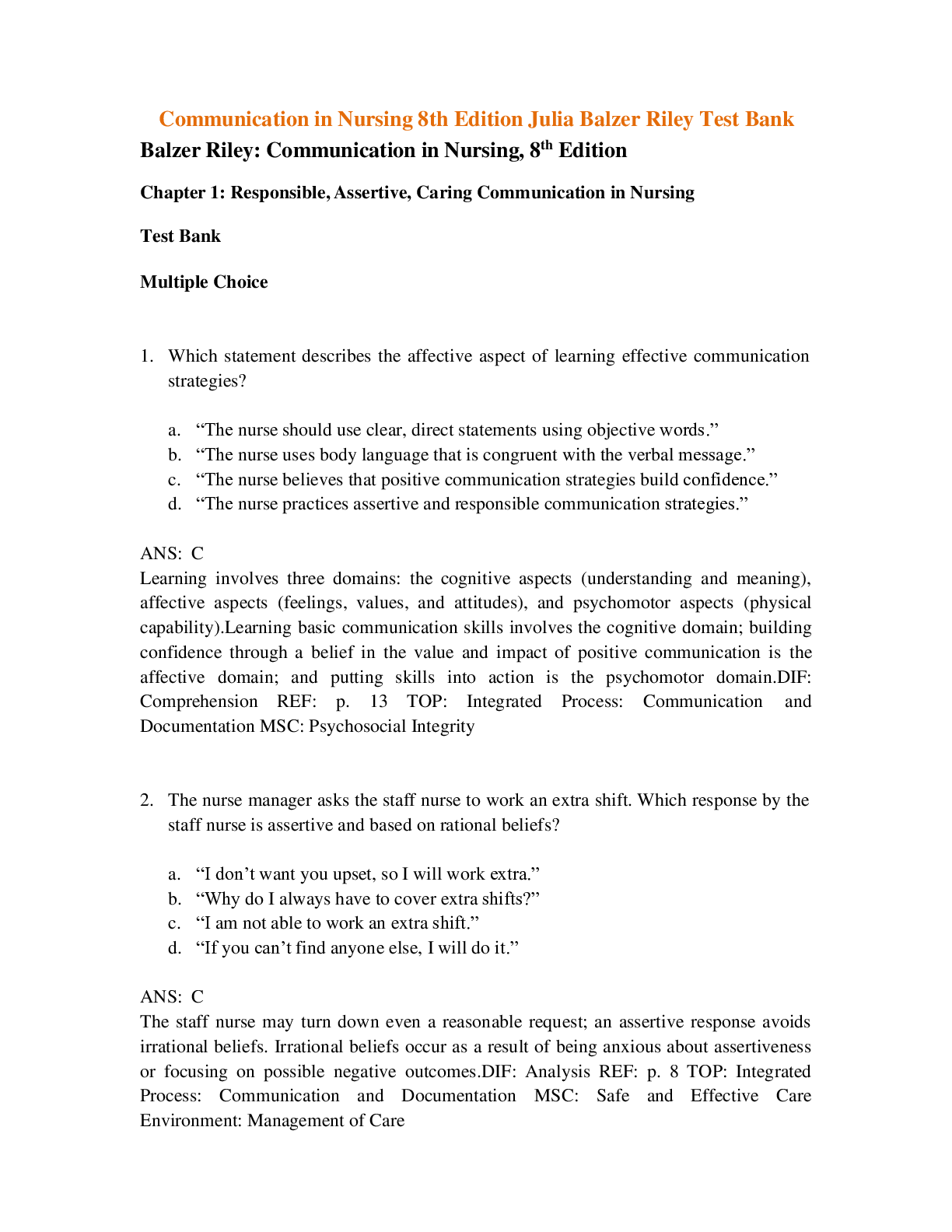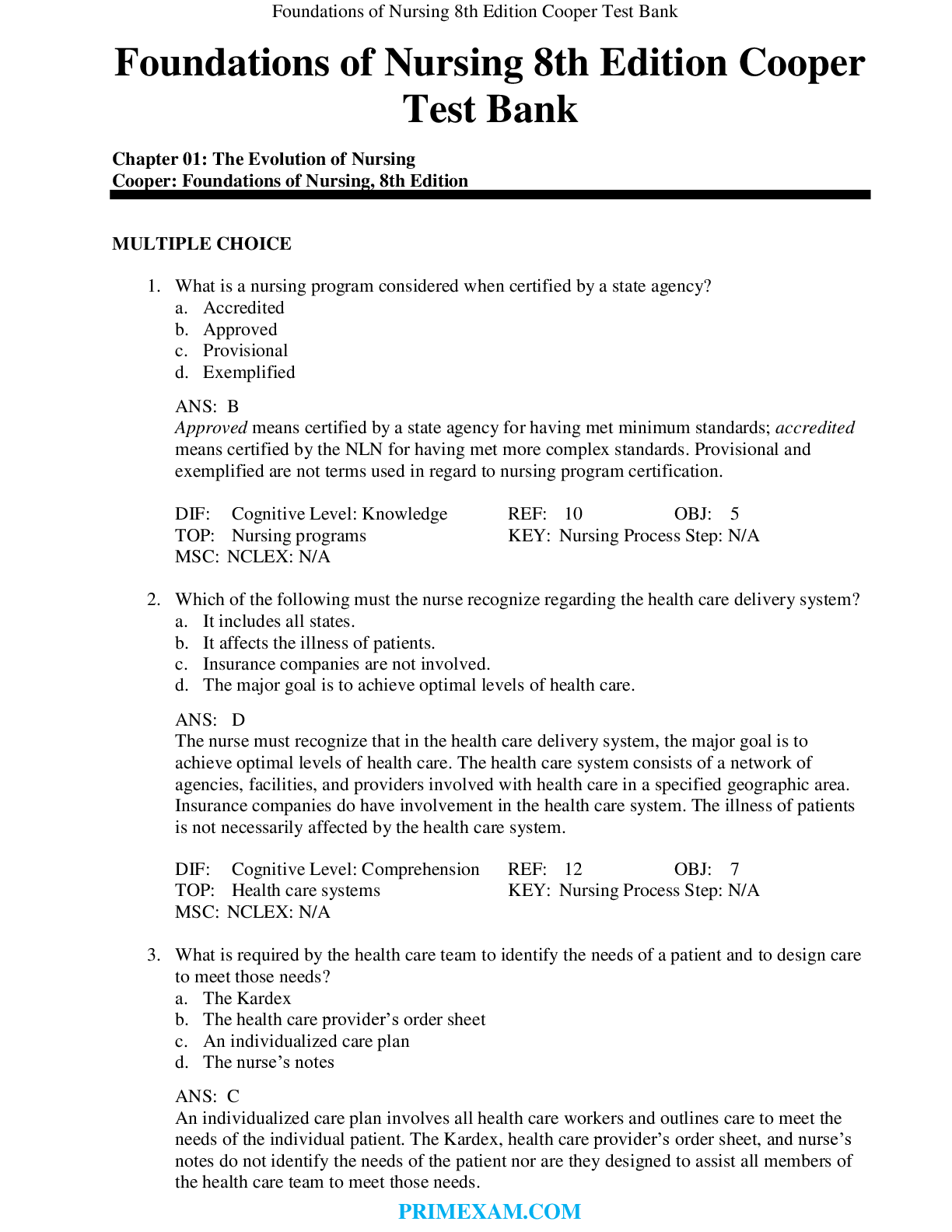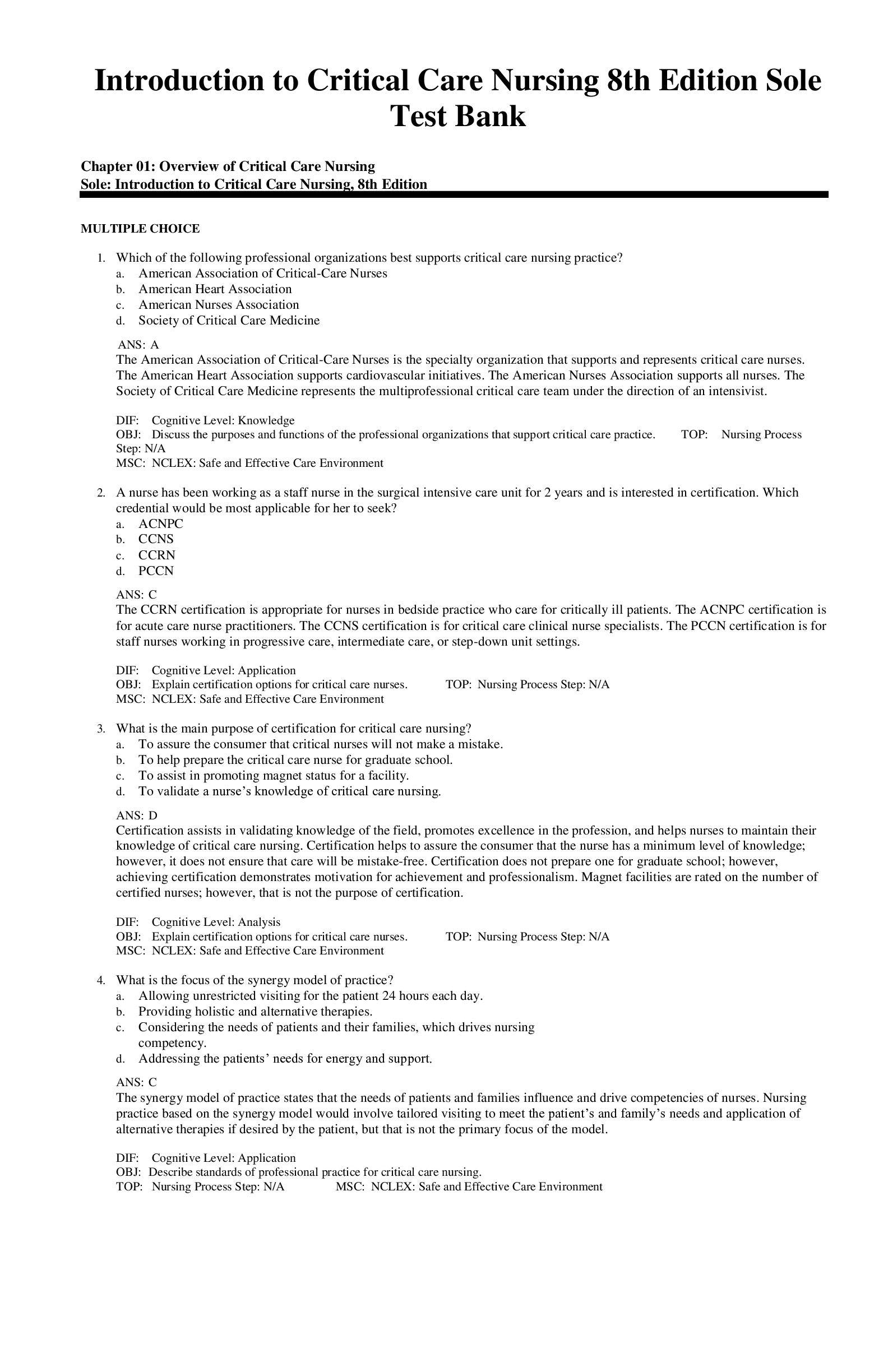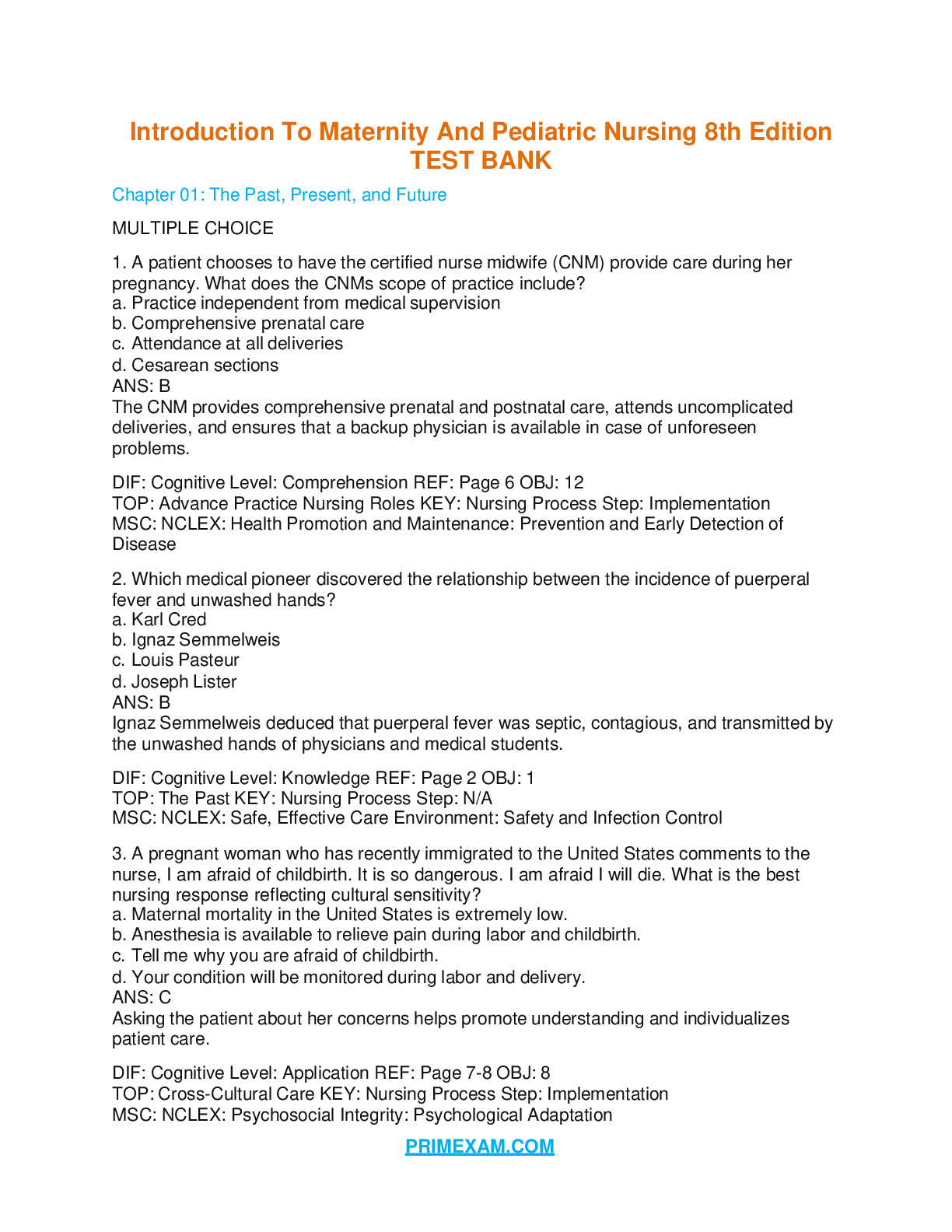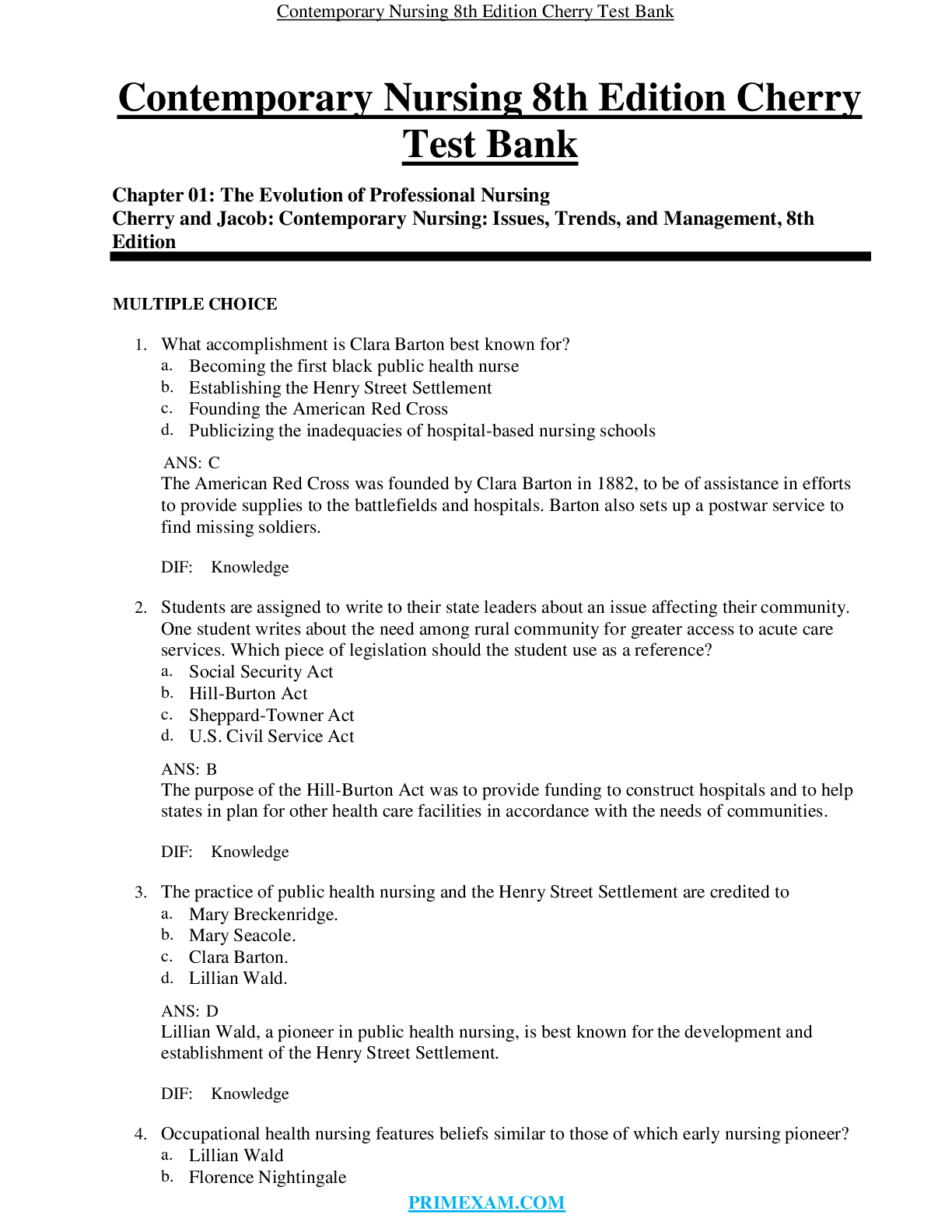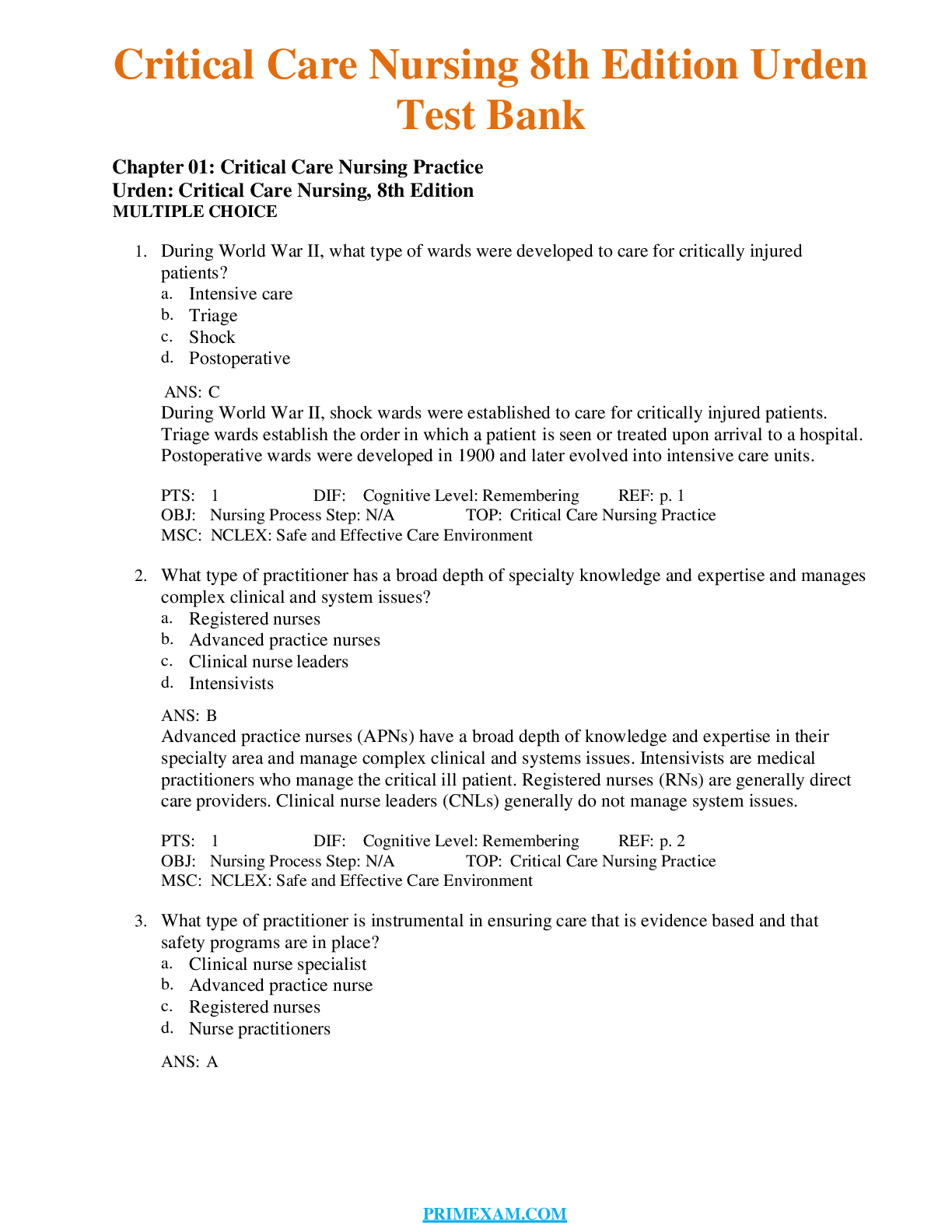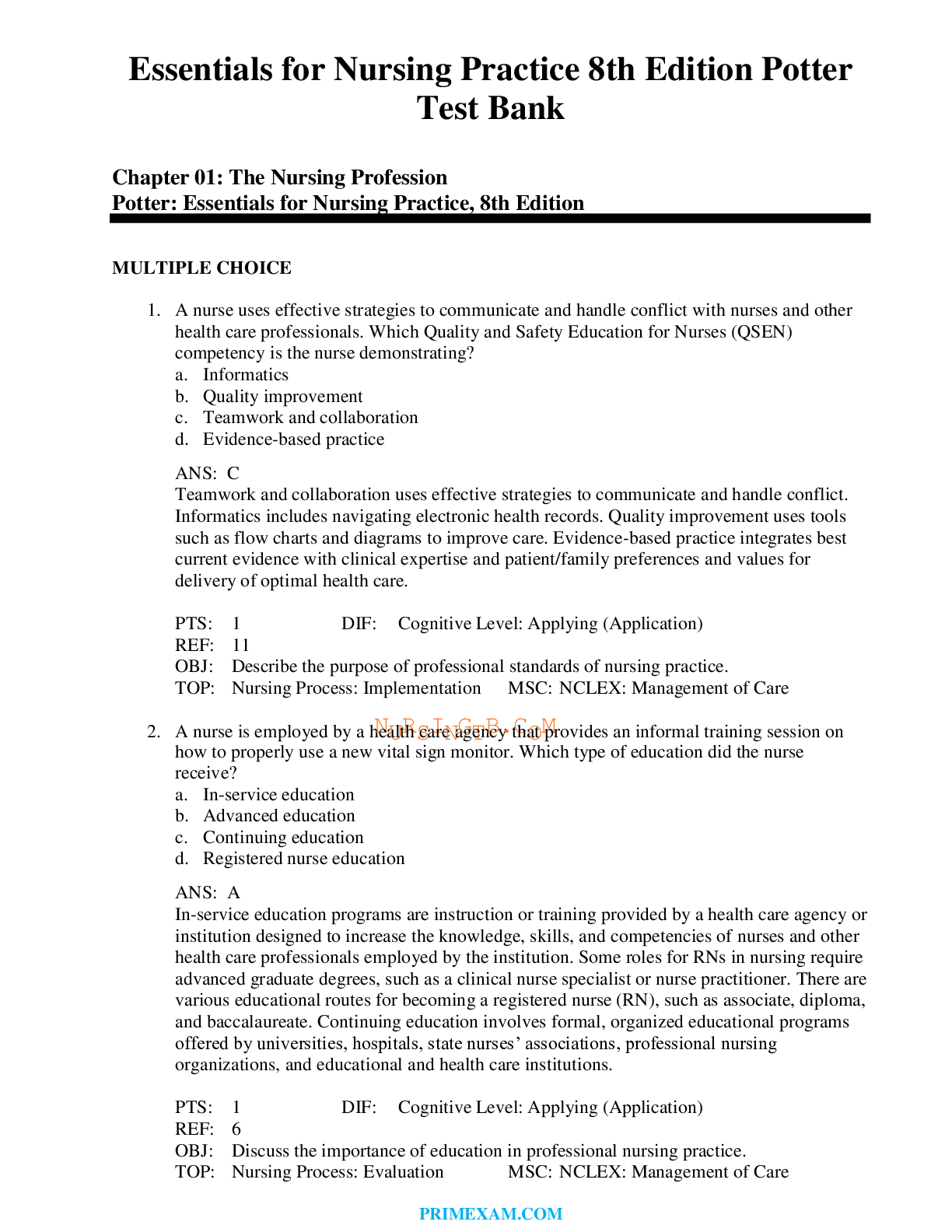*NURSING > TEST BANK > Essentials of Psychiatric Mental Health Nursing 8th Edition Concepts of Care in Evidence- Based Prac (All)
Essentials of Psychiatric Mental Health Nursing 8th Edition Concepts of Care in Evidence- Based Practice 8th Edition Morgan Townsend Test Bank
Document Content and Description Below
Essentials of Psychiatric Mental Health Nursing 8th Edition Concepts of Care in Evidence- Based Practice 8th Edition Morgan Townsend Test Bank Chapter 1. Mental Health and Mental Illness Multiple... Choice 1.A nurse is assessing a client who is experiencing occasional feelings of sadness because of the recent death of a beloved pet. The clients appetite, sleep patterns, and daily routine have not changed. How should the nurse interpret the clients behaviors? 1. The clients behaviors demonstrate mental illness in the form of depression. 2. The clients behaviors are extensive, which indicates the presence of mental illness. 3. The clients behaviors are not congruent with cultural norms. 4. The clients behaviors demonstrate no functional impairment, indicating no mental illness. ANS: 4 Rationale: The nurse should assess that the clients daily functioning is not impaired. The client who experiences feelings of sadness after the loss of a pet is responding within normal expectations. Without significant impairment, the clients distress does not indicate a mental illness. Cognitive Level: Analysis Integrated Process: Assessment 2. At what point should the nurse determine that a client is at risk for developing a mental illness? 1. When thoughts, feelings, and behaviors are not reflective of the DSM-5 criteria. 2. When maladaptive responses to stress are coupled with interference in daily functioning. 3. When a client communicates significant distress. 4. When a client uses defense mechanisms as ego protection. ANS: 2 Rationale: The nurse should determine that the client is at risk for mental illness when responses to stress are maladaptive and interfere with daily functioning. The DSM-5 indicates that in order to be diagnosed with a mental illness, daily functioning must be significantly impaired. The clients ability to communicate distress would be considered a positive attribute. Cognitive Level: Application Integrated Process: Assessment 3. A nurse is assessing a set of 15-year-old identical twins who respond very differently to stress. One twin becomes anxious and irritable, and the other withdraws and cries. How should the nurse explain these different stress responses to the parents? 1. Reactions to stress are relative rather than absolute; individual responses to stress vary. 2. It is abnormal for identical twins to react differently to similar stressors. 3. Identical twins should share the same temperament and respond similarly to stress. 4. Environmental influences to stress weigh more heavily than genetic influences. ANS: 1 Rationale: The nurse should explain to the parents that, although the twins have identical DNA, there are several other factors that affect reactions to stress. Mental health is a state of being that is relative to the individual client. Environmental influences and temperament can affect stress reactions. Cognitive Level: Application Integrated Process: Implementation 4. Which client should the nurse anticipate to be most receptive to psychiatric treatment? 1. A Jewish, female social worker. 2. A Baptist, homeless male. 3. A Catholic, black male. 4. A Protestant, Swedish business executive. ANS: 1 Rationale: The nurse should anticipate that the client of Jewish culture would place a high importance on preventative health care and would consider mental health as equally important as physical health. Women are also more likely to seek treatment for mental health problems than men. Cognitive Level: Application Integrated Process: Planning 5. A psychiatric nurse intern states, This clients use of defense mechanisms should be eliminated. Which is a correct evaluation of this nurses statement? 1. Defense mechanisms can be appropriate responses to stress and need not be eliminated. 2. Defense mechanisms are a maladaptive attempt of the ego to manage anxiety and should always be eliminated. 3. Defense mechanisms, used by individuals with weak ego integrity, should be discouraged and not eliminated. 4. Defense mechanisms cause disintegration of the ego and should be fostered and encouraged. ANS: 1 Rationale: The nurse should determine that defense mechanisms can be appropriate during times of stress. The client with no defense mechanisms may have a lower tolerance for stress, thus leading to anxiety disorders. Defense mechanisms should be confronted when they impede the client from developing healthy coping skills. Cognitive Level: Application Integrated Process: Evaluation 6. During an intake assessment, a nurse asks both physiological and psychosocial questions. The client angrily responds, Im here for my heart, not my head problems. Which is the nurses best response? 1. Its just a routine part of our assessment. All clients are asked these same questions. 2. Why are you concerned about these types of questions? 3. Psychological factors, like excessive stress, have been found to affect medical conditions. 4. We can skip these questions, if you like. It isnt imperative that we complete this section. ANS: 3 Rationale: The nurse should attempt to educate the client on the negative effects of excessive stress on medical conditions. It is not appropriate to skip physiological and psychosocial questions, as this would lead to an inaccurate assessment. Cognitive Level: Application Integrated Process: Implementation 7. An employee uses the defense mechanism of displacement when the boss openly disagrees with suggestions. What behavior would be expected from this employee? 1. The employee assertively confronts the boss. 2. The employee leaves the staff meeting to work out in the gym. 3. The employee criticizes a coworker. 4. The employee takes the boss out to lunch. ANS: 3 Rationale: The nurse should expect that the client using the defense mechanism displacement would criticize a coworker after being confronted by the boss. Displacement refers to transferring feelings from one target to a neutral or less-threatening target. Cognitive Level: Analysis Integrated Process: Assessment 8. A fourth-grade boy teases and makes jokes about a cute girl in his class. This behavior should be identified by a nurse as indicative of which defense mechanism? 1. Displacement 2. Projection 3. Reaction formation 4. Sublimation ANS: 3 Rationale: The nurse should identify that the boy is using reaction formation as a defense mechanism. Reaction formation is the attempt to prevent undesirable thoughts from being expressed by expressing opposite thoughts or behaviors. Displacement refers to transferring feelings from one target to another. Rationalization refers to making excuses to justify behavior. Projection refers to the attribution of unacceptable feelings or behaviors to another person. Sublimation refers to channeling unacceptable drives or impulses into more constructive, acceptable activities. Cognitive Level: Application Integrated Process: Assessment 9. Which nursing statement about the concept of neurosis is most accurate? 1. An individual experiencing neurosis is unaware that he or she is experiencing distress. 2. An individual experiencing neurosis feels helpless to change his or her situation. 3. An individual experiencing neurosis is aware of psychological causes of his or her behavior. 4. An individual experiencing neurosis has a loss of contact with reality. ANS: 2 Rationale: The nurse should define the concept of neurosis with the following characteristics: The client feels helpless to change his or her situation, the client is aware that he or she is experiencing distress, the client is aware the behaviors are maladaptive, the client is unaware of the psychological causes of the distress, and the client experiences no loss of contact with reality. Cognitive Level: Application Integrated Process: Assessment 10. Which nursing statement regarding the concept of psychosis is most accurate? 1. Individuals experiencing psychoses are aware that their behaviors are maladaptive. 2. Individuals experiencing psychoses experience little distress. 3. Individuals experiencing psychoses are aware of experiencing psychological problems. 4. Individuals experiencing psychoses are based in reality. ANS: 2 Rationale: The nurse should understand that the client with psychosis experiences little distress owing to his or her lack of awareness of reality. The client with psychosis is unaware that his or her behavior is maladaptive or that he or she has a psychological problem. Cognitive Level: Application Integrated Process: Assessment 11. When under stress, a client routinely uses alcohol to excess. Finding her drunk, her husband yells at the client about her chronic alcohol abuse. Which action alerts the nurse to the clients use of the defense mechanism of denial? 1. The client hides liquor bottles in a closet. 2. The client yells at her son for slouching in his chair. 3. The client burns dinner on purpose. 4. The client says to the spouse, I dont drink too much! ANS: 4 Rationale: The clients statement I dont drink too much! alerts the nurse to the use of the defense mechanism of denial. The client is refusing to acknowledge the existence of a real situation and the feelings associated with it. Cognitive Level: Application Integrated Process: Assessment 12. Devastated by a divorce from an abusive husband, a wife completes grief counseling. Which statement by the wife should indicate to a nurse that the client is in the acceptance stage of grief? 1. If only we could have tried again, things might have worked out. 2. I am so mad that the children and I had to put up with him as long as we did. 3. Yes, it was a difficult relationship, but I think I have learned from the experience. 4. I still dont have any appetite and continue to lose weight. ANS: 3 Rationale: The nurse should evaluate that the client is in the acceptance stage of grief because during this stage of the grief process, the client would be able to focus on the reality of the loss and its meaning in relation to life. Cognitive Level: Analysis Integrated Process: Evaluation 13. A nurse is performing a mental health assessment on an adult client. According to Maslows hierarchy of needs, which client action would demonstrate the highest achievement in terms of mental health?1. Maintaining a long-term, faithful, intimate relationship.2. Achieving a sense of self-confidence.3. Possessing a feeling of self-fulfillment and realizing full potential.4. Developing a sense of purpose and the ability to direct activities. ANS: 3 Rationale: The nurse should identify that the client who possesses a feeling of self-fulfillment and realizes his or her full potential has achieved self-actualization, the highest level on Maslows hierarchy of needs. Cognitive Level: Application Integrated Process: Assessment 14. According to Maslows hierarchy of needs, which situation on an in-patient psychiatric unit would require priority intervention by a nurse?1. A client rudely complaining about limited visiting hours.2. A client exhibiting aggressive behavior toward another client.3. A client stating that no one cares. 4. A client verbalizing feelings of failure. ANS: 2 Rationale: The nurse should immediately intervene when a client exhibits aggressive behavior toward another client. Safety and security are considered lower-level needs according to Maslows hierarchy of needs and must be fulfilled before other higher-level needs can be met. Clients who complain, have feelings of failure, or state that no one cares are struggling with higher-level needs such as the need for love and belonging or the need for self-esteem. Cognitive Level: Analysis Integrated Process: Evaluation 15. How would a nurse best complete the new DSM-5 definition of a mental disorder? A health condition characterized by significant dysfunction in an individuals cognitions, or behaviors that reflects a disturbance in the 1. psychosocial, biological, or developmental process underlying mental functioning. 2. psychological, cognitive, or developmental process underlying mental functioning. 3. psychological, biological, or developmental process underlying mental functioning. 4. psychological, biological, or psychosocial process underlying mental functioning. ANS: 3 Rationale: A health condition characterized by significant dysfunction in an individuals cognitions, or behaviors that reflects a disturbance in the psychological, biological, or developmental process underlying mental functioning, is the new DSM 5 definition of a mental disorder. Cognitive Level: Application Integrated Process: Assessment Multiple Response 16. A nurse is assessing a client who appears to be experiencing some anxiety during questioning. Which symptoms might the client demonstrate that would indicate anxiety? (Select all that apply.) 1. Fidgeting 2. Laughing inappropriately 3. Palpitations 4. Nail biting 5. Limited attention span ANS: 1, 2, 4 Rationale: The nurse should assess that fidgeting, laughing inappropriately, and nail biting are indicative of heightened stress levels. The client would not be diagnosed with mental illness unless there is significant impairment in other areas of daily functioning. Other indicators of more serious anxiety are restlessness, difficulty concentrating, muscle tension, and sleep disturbance. Cognitive Level: Application Integrated Process: Assessment Fill-in-the-Blank 17. is a diffuse apprehension that is vague in nature and is associated with feelings of uncertainty and helplessness. ANS: Anxiety Rationale: The definition of anxiety is a diffuse apprehension that is vague in nature and is associated with feelings of uncertainty and helplessness. Townsend considers this a core concept. Cognitive Level: Application Integrated Process: Assessment 18. is a subjective state of emotional, physical, and social responses to the loss of a valued entity. ANS: Grief Rationale: The definition of grief is a subjective state of emotional, physical, and social responses to the loss of a valued entity. Townsend considers this a core concept. Chapter 2. Biological Implications Multiple Choice 1. A depressed client states, I have a chemical imbalance in my brain. I have no control over my behavior. Medications are my only hope to feel normal again. Which nursing response is appropriate?1. Medications only address biological factors. Environmental and interpersonal factors must also be considered.2. Because biological factors are the sole cause of depression, medications will improve your mood.3. Environmental factors have been shown to exert the most influence in the development of depression.4. Researchers have been unable to demonstrate [Show More]
Last updated: 1 year ago
Preview 1 out of 248 pages

Reviews( 0 )
Document information
Connected school, study & course
About the document
Uploaded On
Sep 22, 2020
Number of pages
248
Written in
Additional information
This document has been written for:
Uploaded
Sep 22, 2020
Downloads
0
Views
37


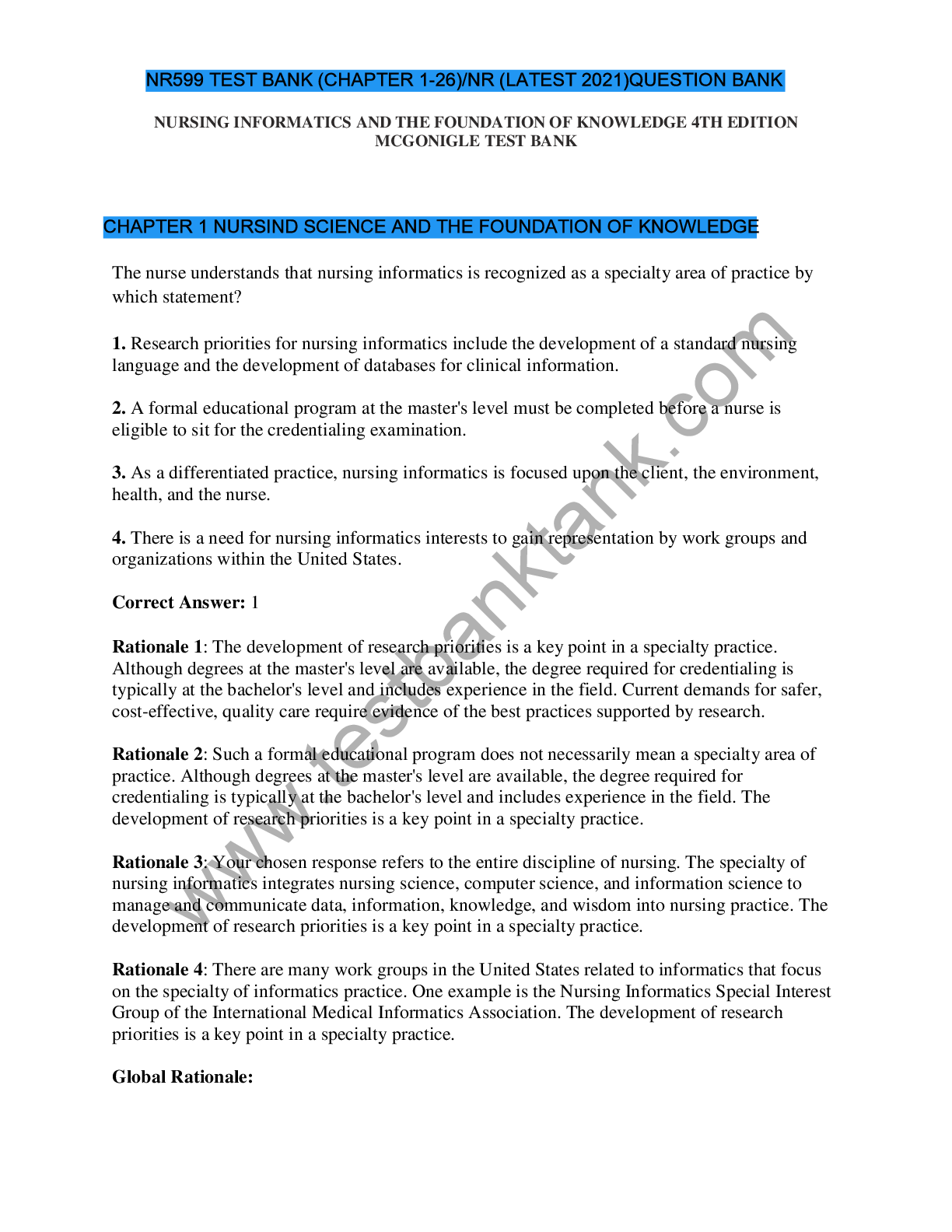
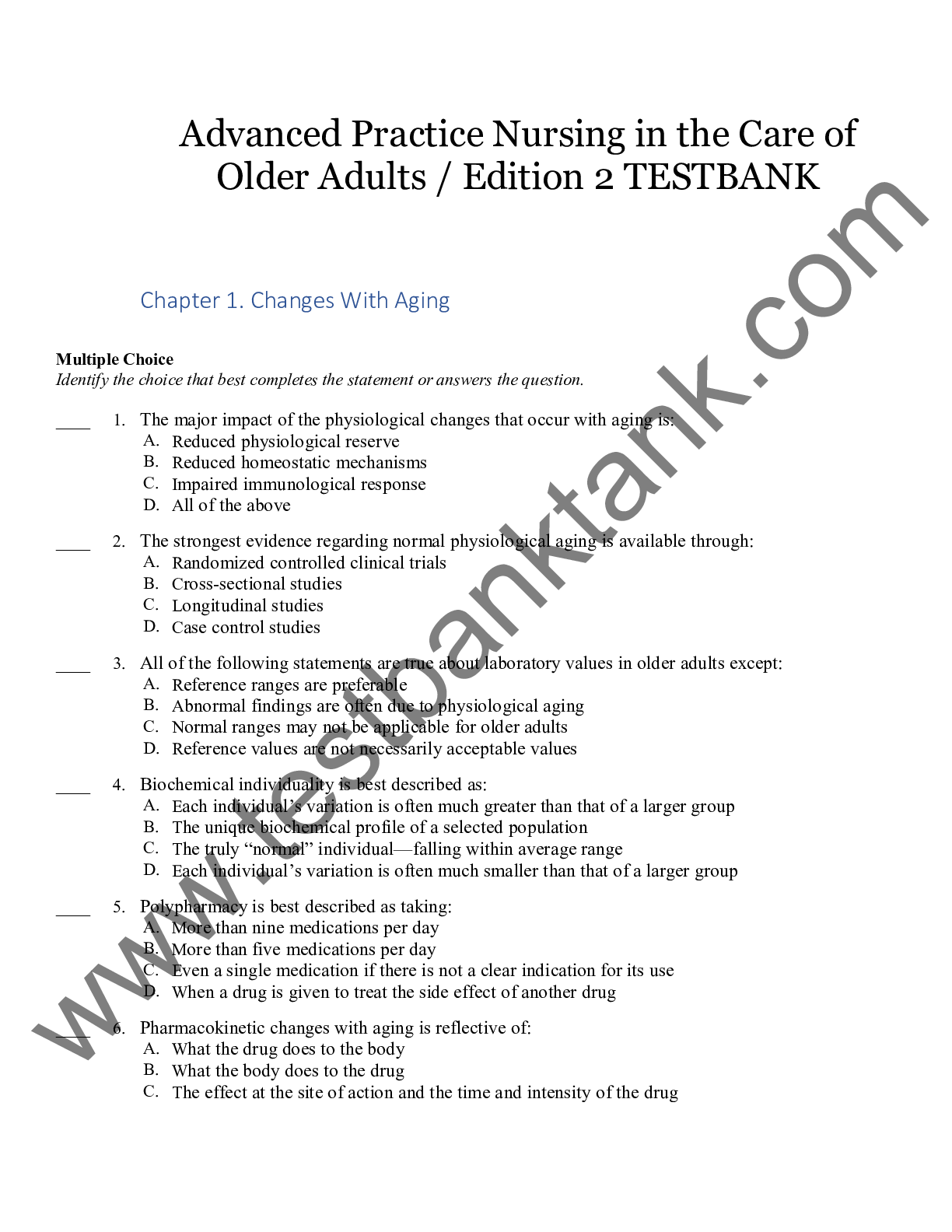
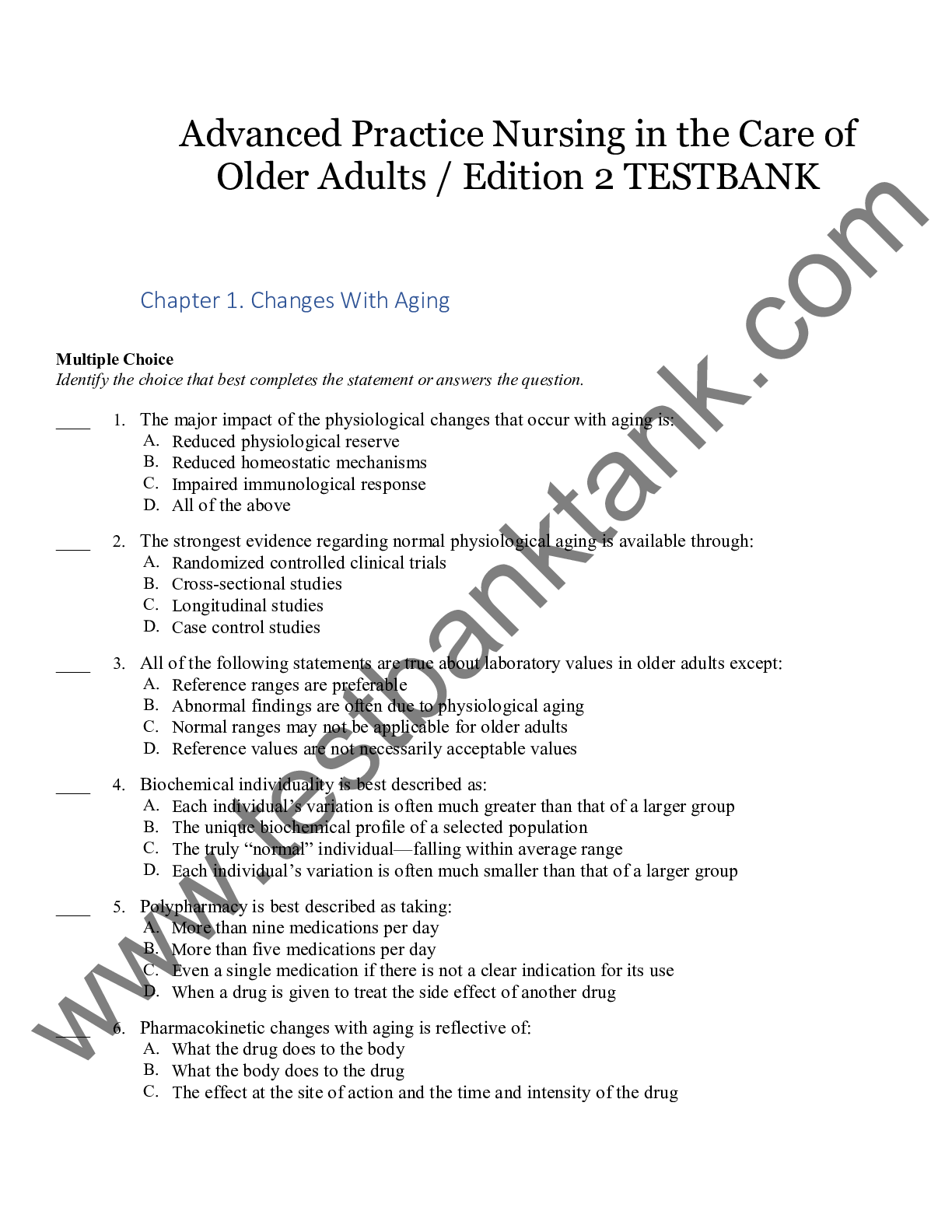
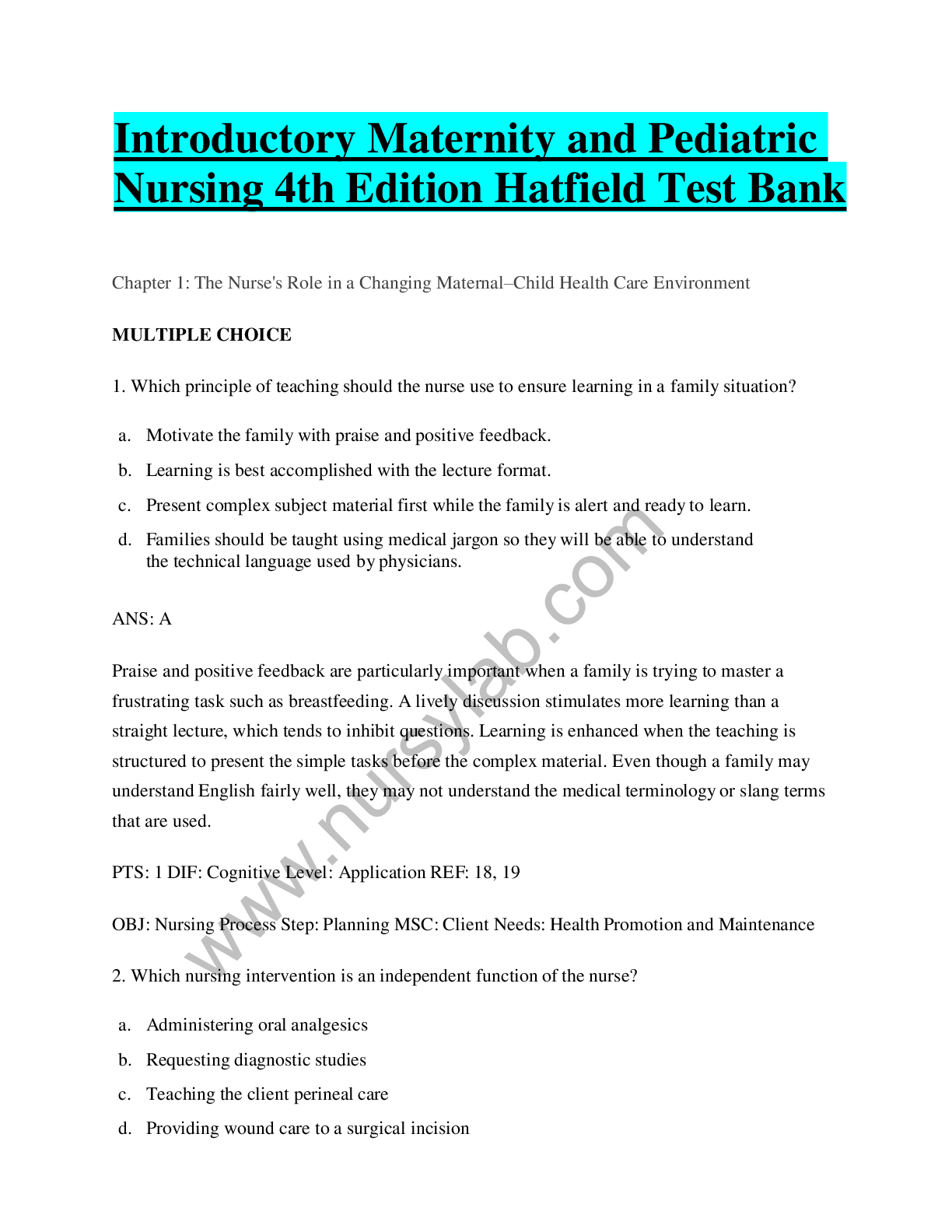
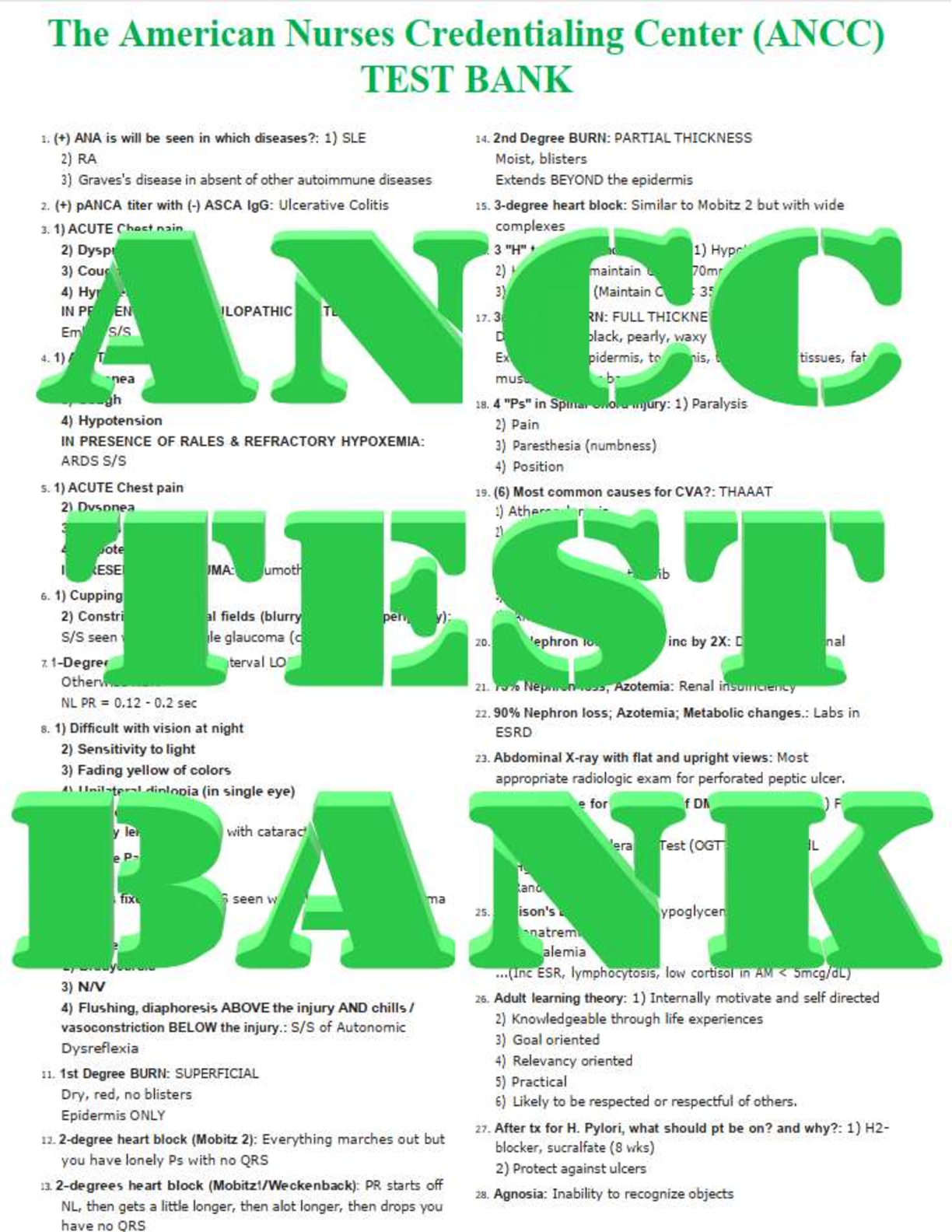
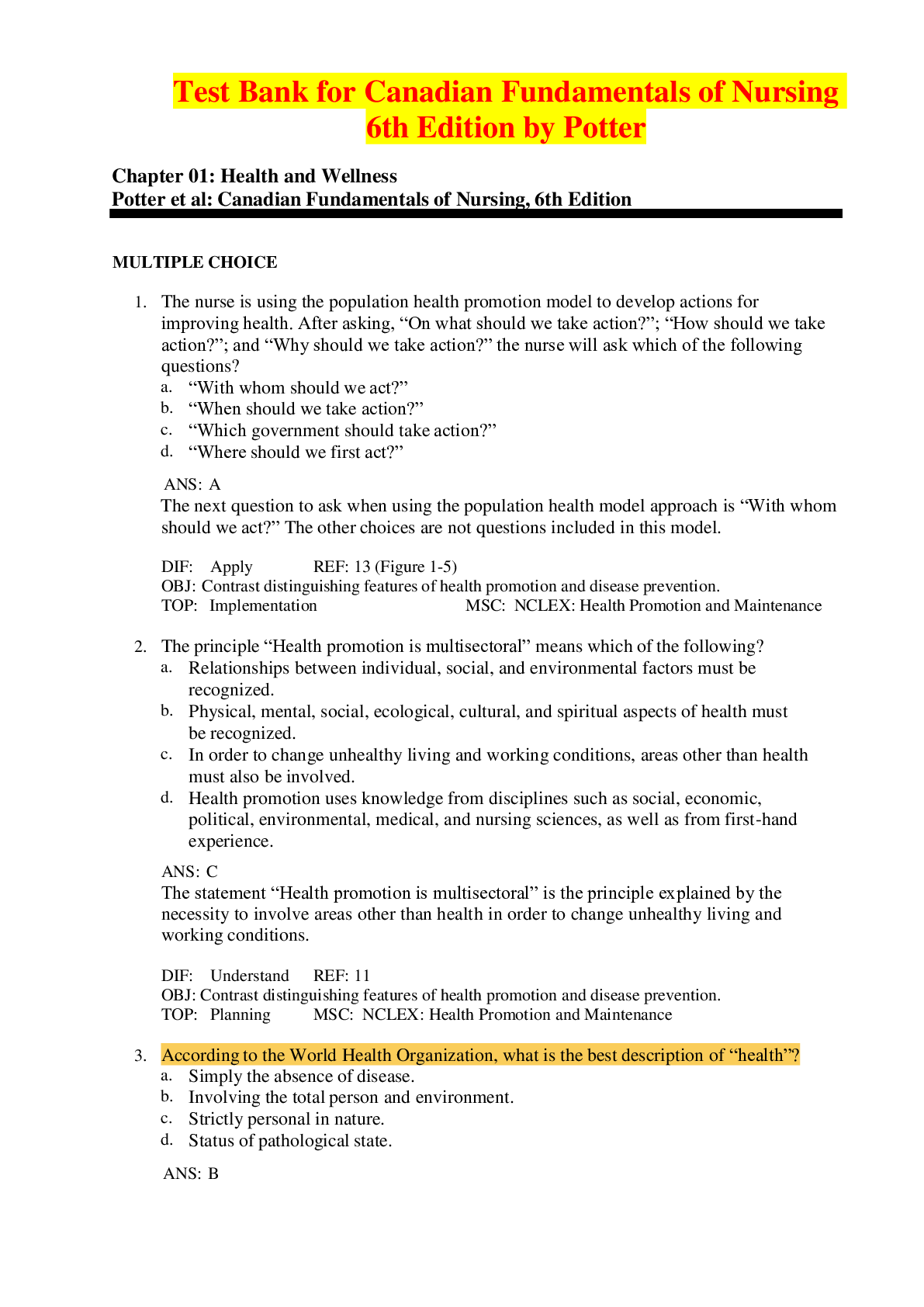
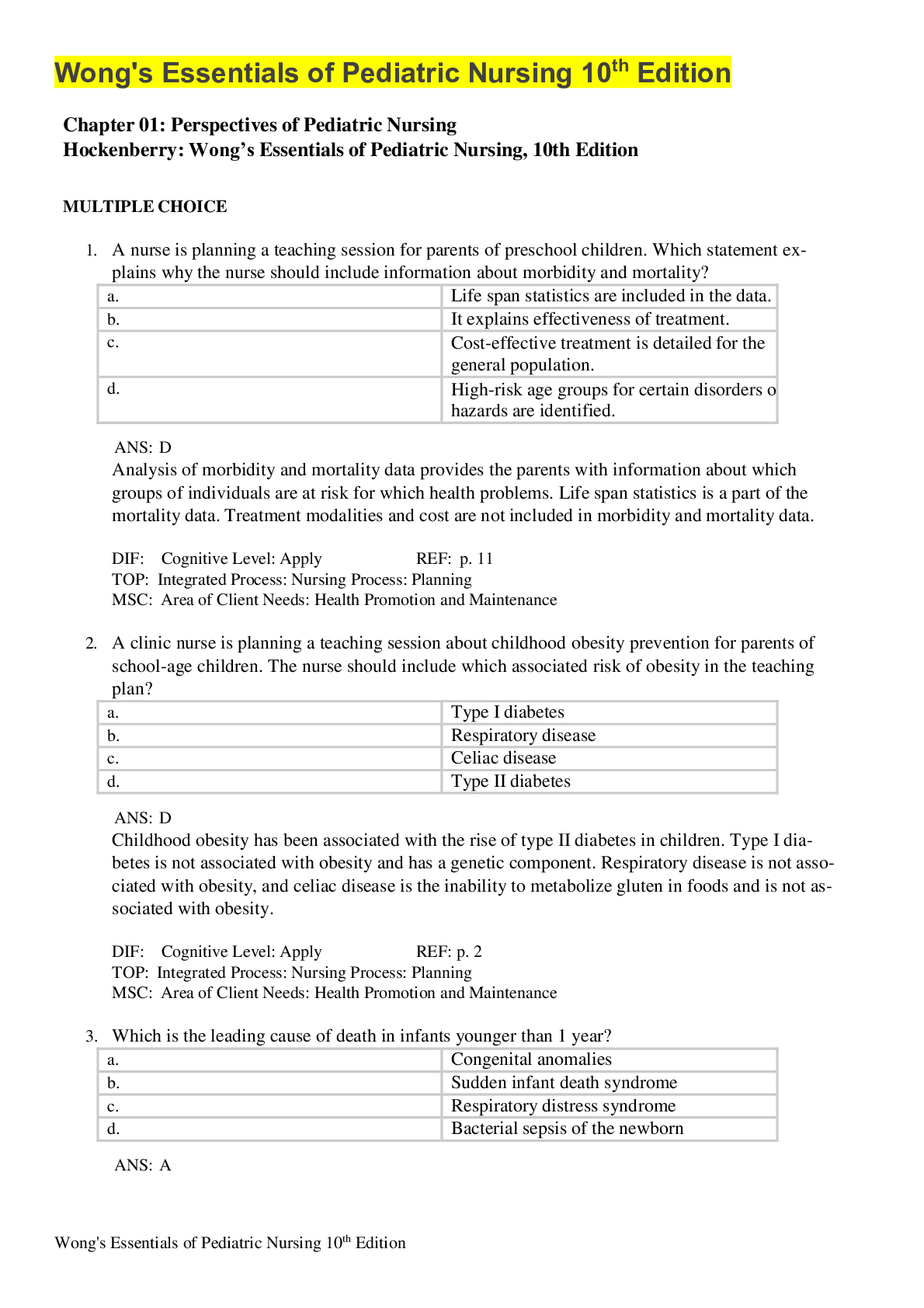
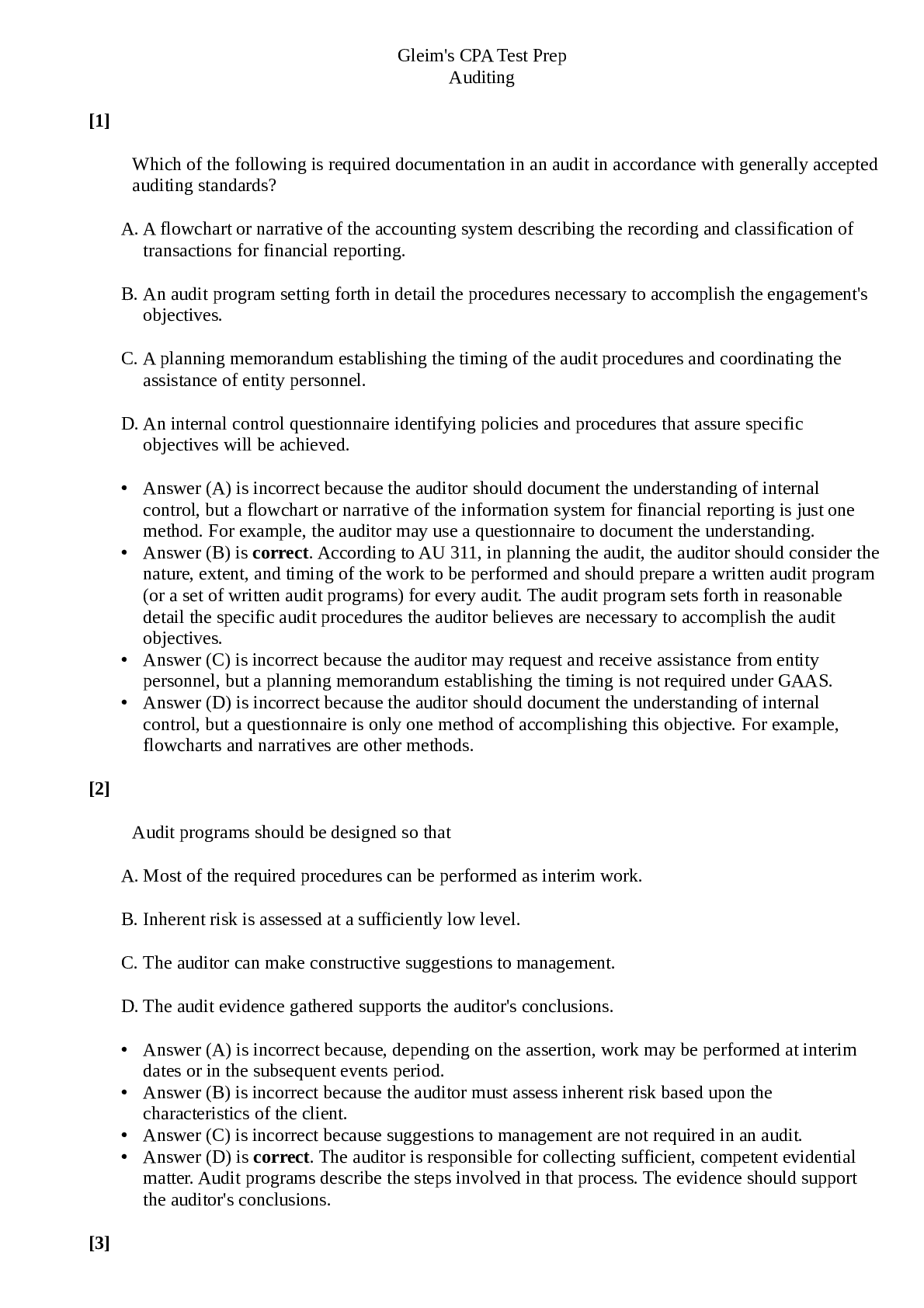
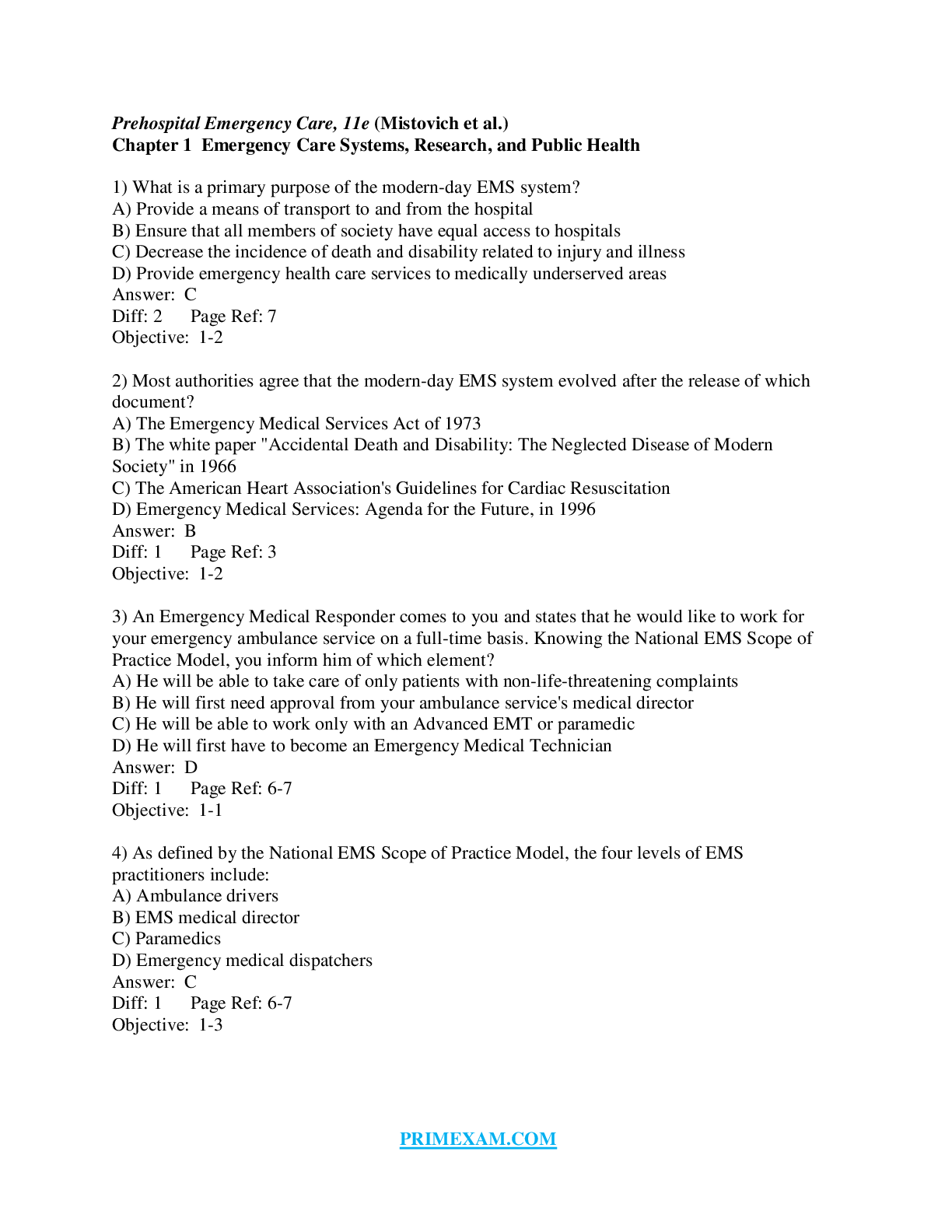

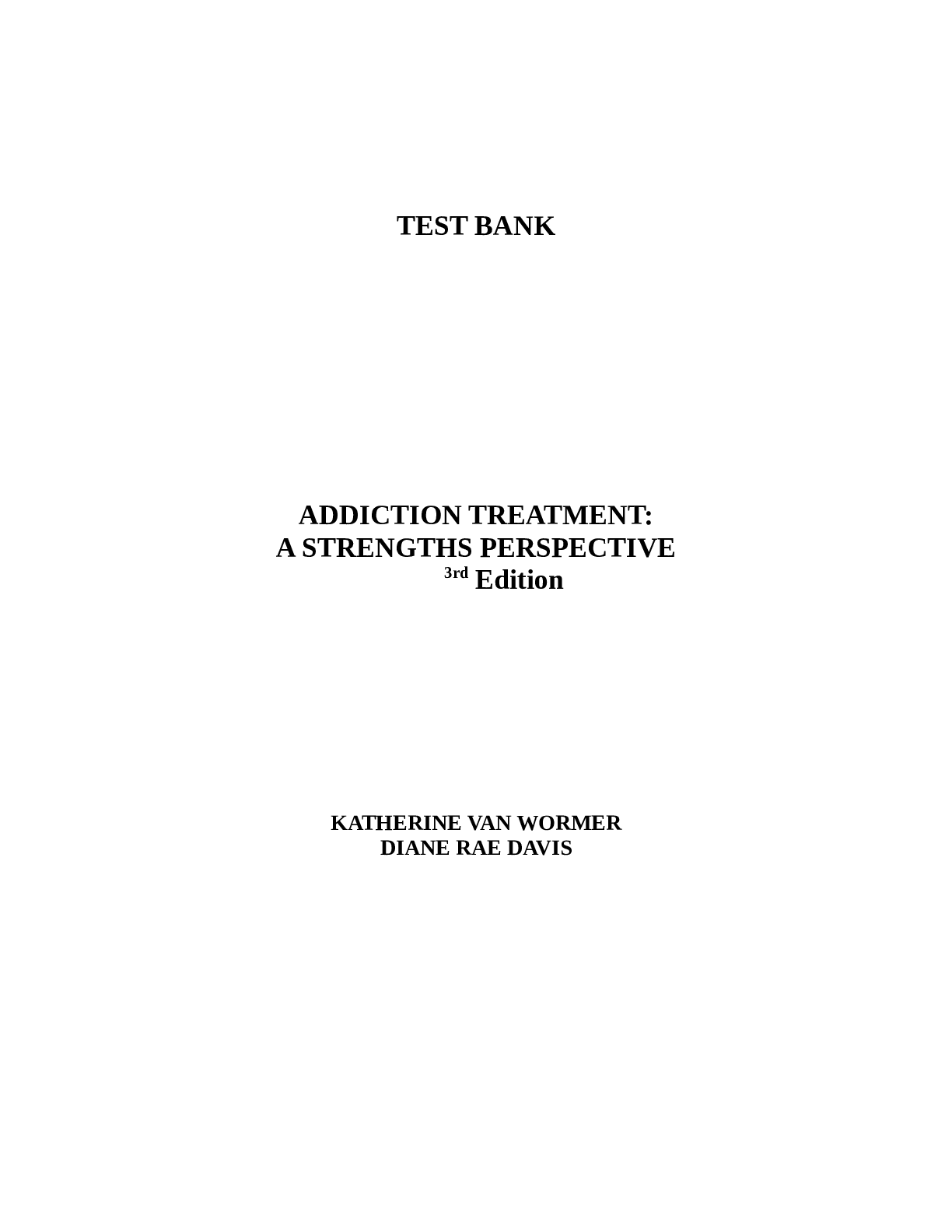
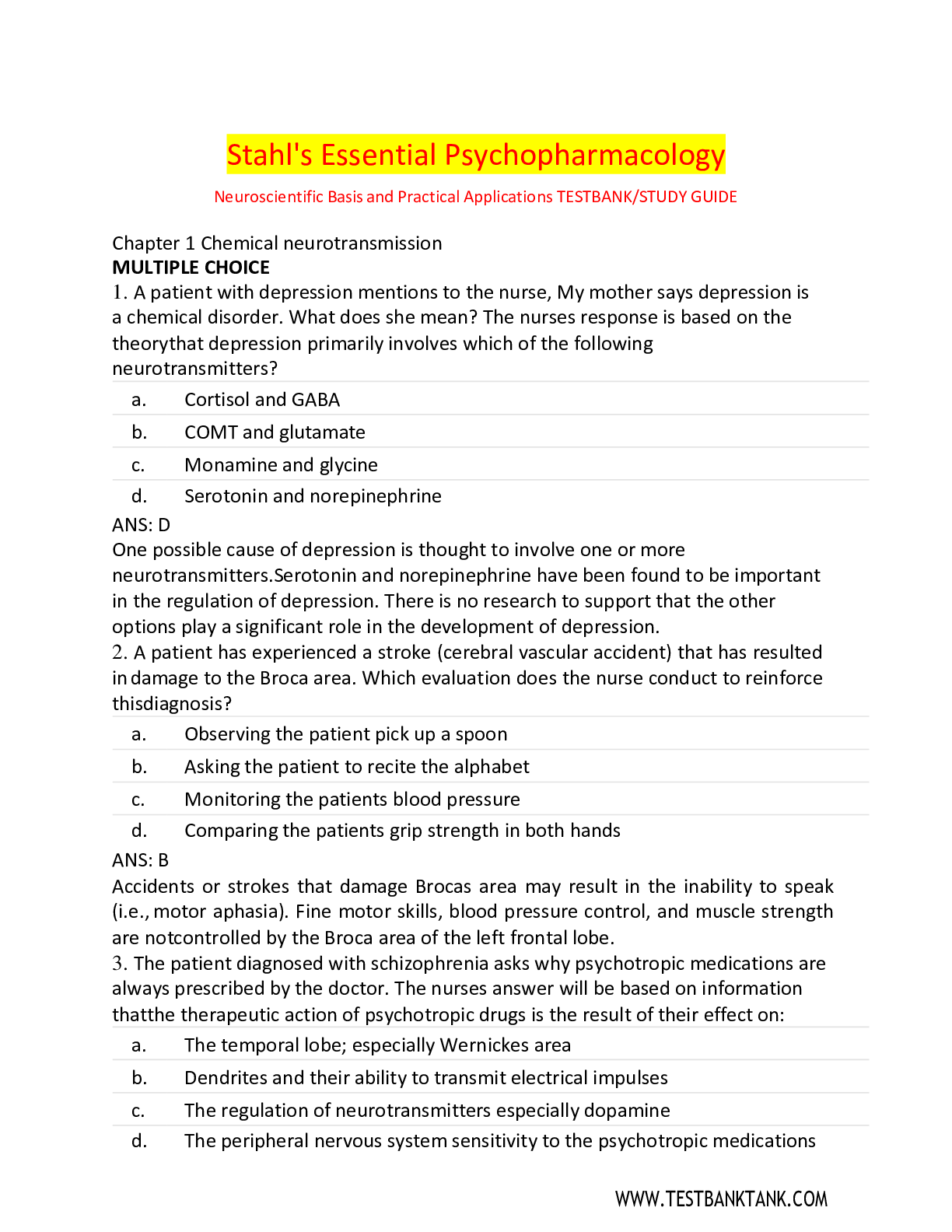
 Securities Institute of America - Wiley series 63 exam review 2016 + test bank_ the uniform securities state law examination-John Wiley and Sons (2016).png)
